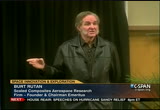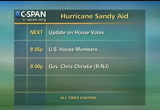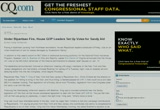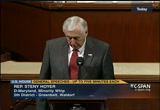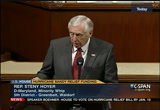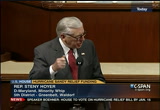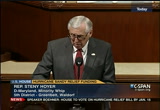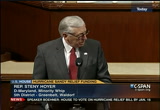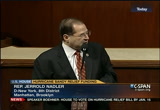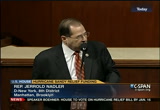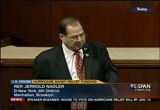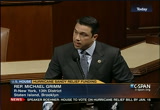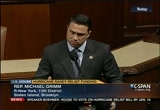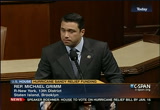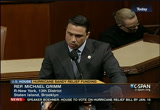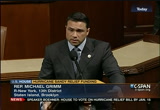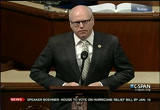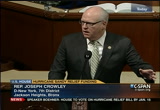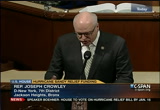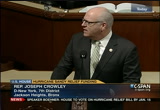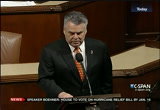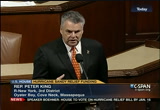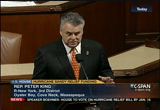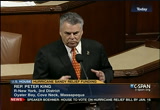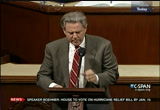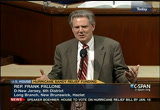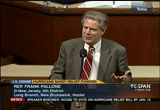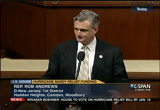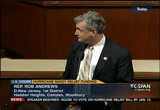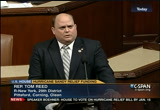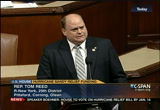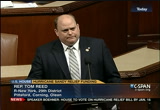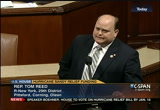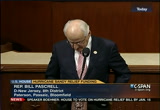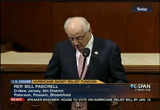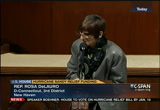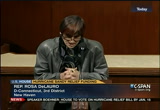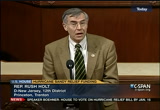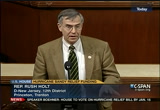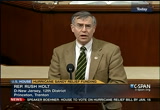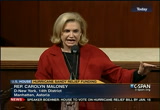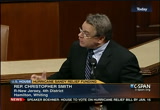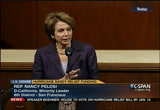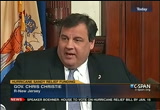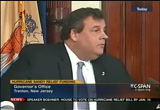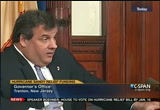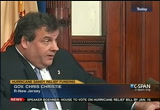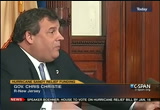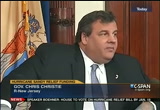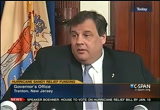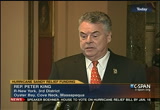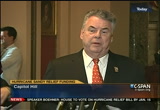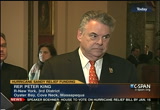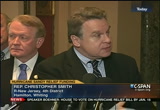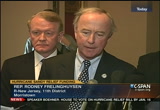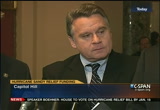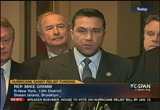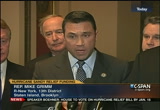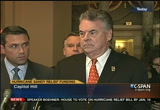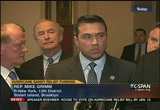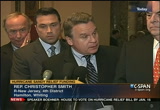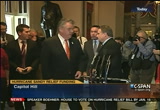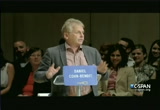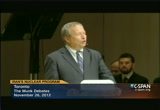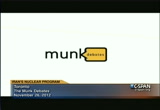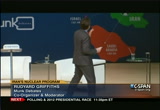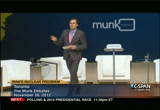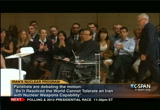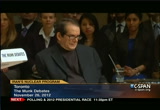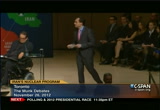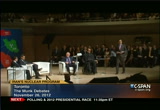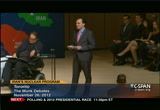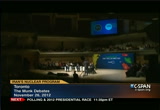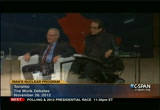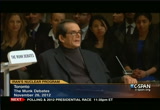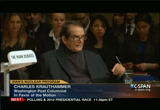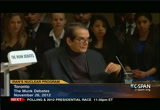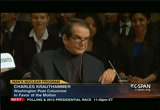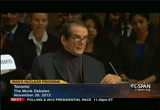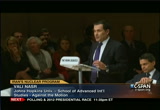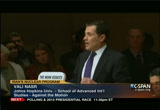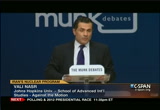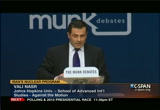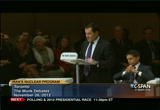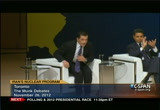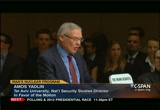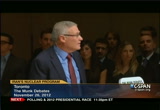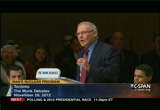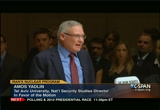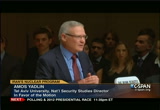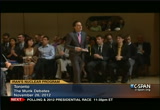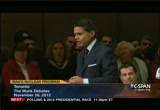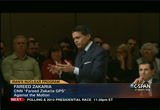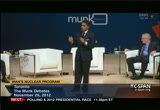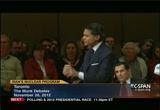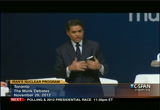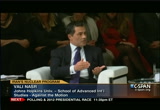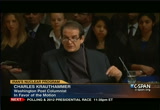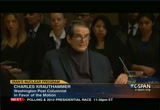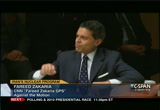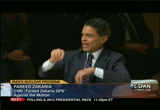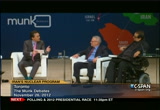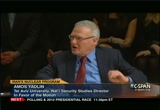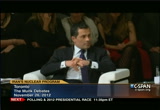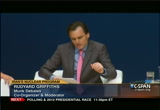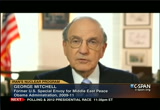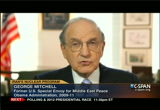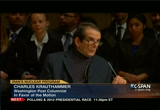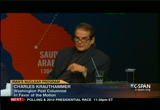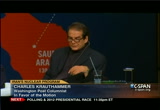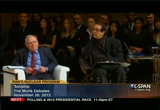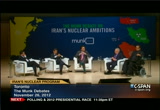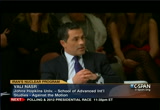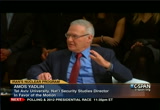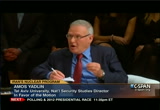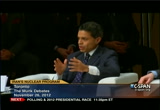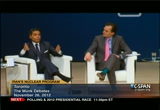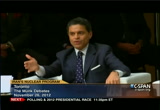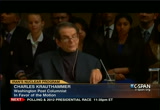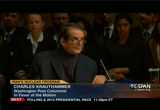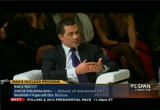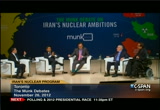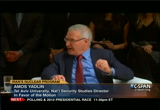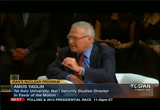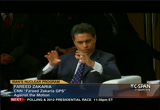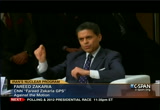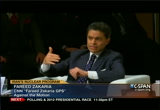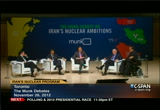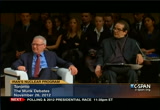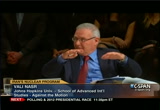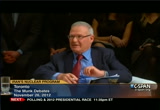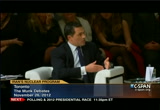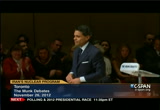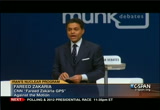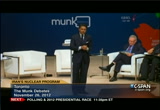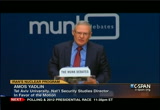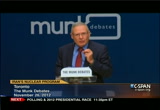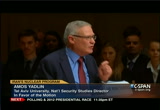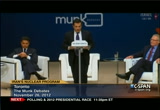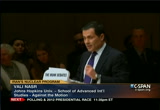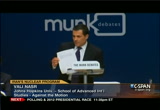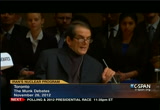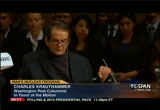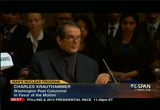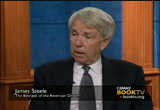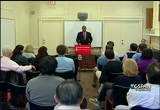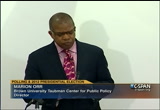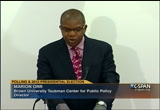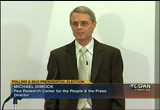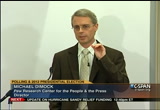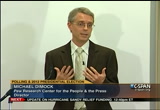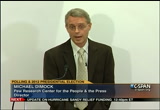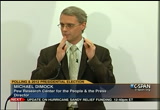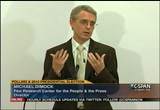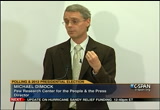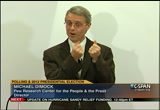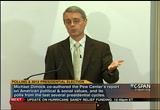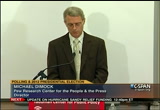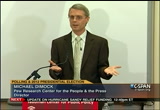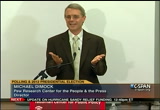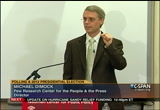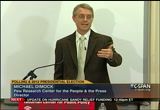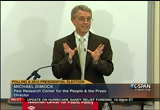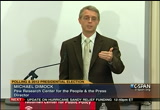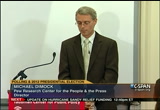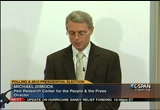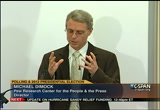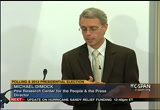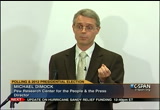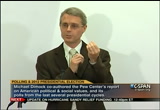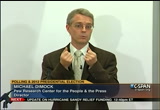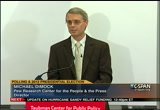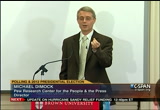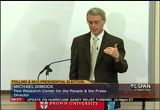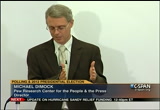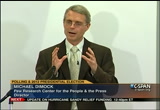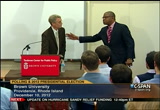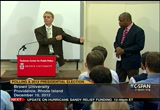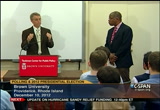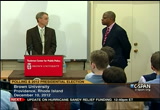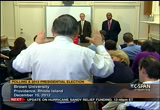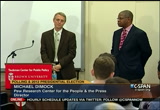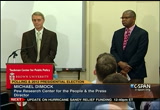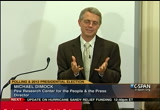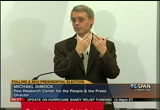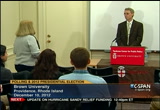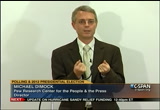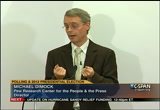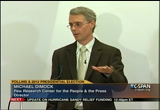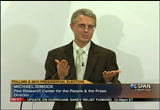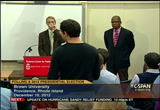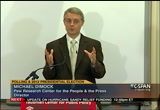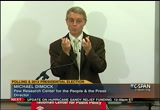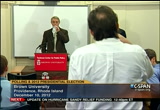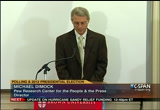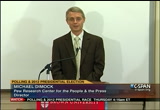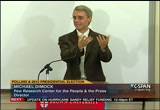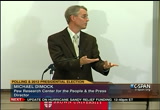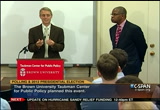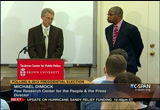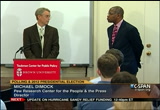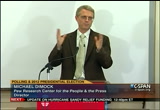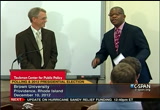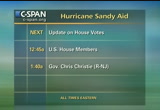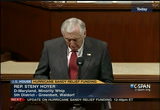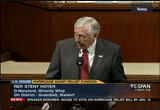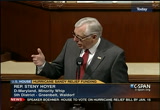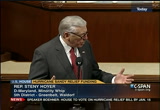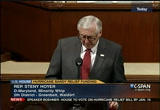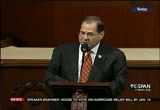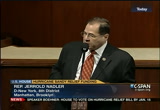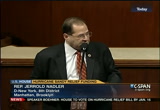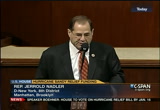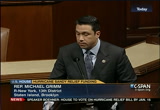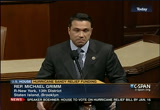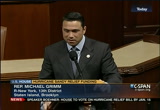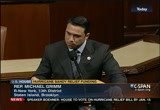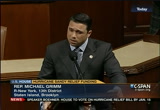tv Capitol Hill Hearings CSPAN January 2, 2013 8:00pm-1:00am EST
8:00 pm
and, yeah, they're stealth, but, hell, all airplanes were stealth before somebody ineventualitied radar. [laughter] so there hasn't been really breakthroughs in performance in any of those categories of airplanes. maybe some of these >> this is the last one. come up and asknd an questions. >> john boehner said the house will vote on a plan for victims at of hurricanes and -- of hurrican sandy. comments in a few minutes. you'll hear this afternoon conference with governor chris christie who was critical of
8:01 pm
house leaders for delaying a vote on hurricane assistance. we spoke with a reporter about today's action. later, houser speaker john baier met with the new jersey delegation about funding saying the should be the first priority. after a day of heated remarks about not considering a disaster aid spending bill, there will be a vote after all. carrie young is joining us. what happened? >> they are moving ahead. the most urgent need is flawed programs which is going to have some trouble. we will see that on friday. and they're picking up the rest of the package on january 15. >> why did they not schedule a vote before the end of the
8:02 pm
congress? >> they expected to go back to this in january. there was a lot going on behind the scenes. >> she started to talk about how it will work going forward. can you elaborate? what is happening next? >> the most dire need is expressing the flood program. maybe around -- that was the same that president obama was requesting. they will come back in -- on the 15th. there is a two-part bill.
8:03 pm
and $27 billion in the first charge -- tranche. a larger bill with long-term recovery money. >> the senate has passed a disaster relief bill. will congress have to start the process all over again in the 113th congress? >> the house was in for about an hour and there was a formality of the session. and they should be able to move fairly quickly. it would happen more unusual to have the senate vote. >> why is getting this bill done as soon as possible important to the lawmakers pushing for a? >> it is not a good practice.
8:04 pm
we heard from people that they had $4 billion. will have to tell people applying for new application to that it will have to hold off on projects. is there to manage this ahead of time there is debate -- there appears to be broad partisan -- bipartisan support. >> we appreciate your time. thank you. >> here's how congressional story rights about the story.
8:05 pm
8:06 pm
the president cleared several maryland counties eligible for federal assistance. it was my citizens are not in dire circumstances. the citizens who will hear from today are in that condition. the counties joined hundreds in a 1,000 mile diameter. the largest to graphically in the history of the atlantic's hurricanes. the speaker said that the victims will need to wait until the next congress to receive assistance. wait. they say to millions who are in pain and in distress.
8:07 pm
we should not be waiting, mr. speaker. we should be voting this very morning which i tell you, mr. speaker, i expected to happen from my discussions with the majority leader. as i said last night, i went with congressman weeks to the rockaways in new york. what i saw there in the aftermath defies description. to those who say that fema has not yet disbursed all the funds it has to assist families and businesses i would tell them they deplete underestimate the damage in these areas and a wide range of assistance required to alleviate the pain and suffering. i saw the mountains of debris
8:08 pm
that the corps of engineers have begun to remove from neighborhoods. it represents people's lives. homes and businesses. with this legislation which would have provided up to $1.60 billion so that families could begin rebuilding. -- what we have to borrow that money? yes. if the furnace when out and the temperature was at zero, you would replace the furnace to keep the family safe. and borrow the money to do so. we would have had to repay and we would. this bill would have allocated $6 billion in emergency aid for food banks to make sure that people in the richest country on the face of the years have some sustenance for them and their children. i saw an area where within 100 homes were devastated by fire when an electric transformer malfunctioned.
8:09 pm
the many firefighters who lived in the neighborhood could not get additional help from surrounding forest -- boroughs due to flooding. there is little left, indeed, none of their homes. i saw local businesses that have been there for years completely destroyed, waiting for the $620 million in sba assistance. we talked about not imposing burdens on small businesses buy additional taxes. the small businesses are out of business without our help. we walk away today from nearly $4 billion in assistance to help reconstruct rockaway beach and other places which is critical to the economic recovery and to prevent further storm damage. finally, the results of the toll on transit and infrastructure including inundated subway and traffic tunnels that were
8:10 pm
referred to last night. this bill would have provided up to $10.90 billion for transit and $2.20 billion for highways to make sure that the area is not just clear of water but repaired. if small businesses will operate it will be because consumers and customers can get to them. and get to the schools, to the hospital's, and get to their families. witting to act until later this month when members are here and waiting to vote last night is not the right choice. no member of this house could travel to the northeast to see the damage and tell anyone in those areas to wait for us to act. wake forest to help. way for us to come to your aid. we cannot and we should not wait. we must not walk away.
8:11 pm
mr. speaker, i urge the speaker of this house to reconsider and to act immediately. now. now is the time to act. i yield back the balance of my time. >> thank you, mr. speaker. sometimes events occur that are so out of the ordinary, so unusual as to defy belief. such as the decision of the speaker last night not to permit this house to vote on relief and aid for these three states and other areas that were devastated by hurricane sandy. i have been in this house for 20 years. there have been many disasters, floods, hurricanes, tornadoes, and earthquakes, wildfires. in every single instance, this house has voted aid for the
8:12 pm
appropriate and necessary states. in every single instance. never more than three. it has been nine weeks when sandy devastated three states in parts or more. nine weeks. the senate passed the bill. the house was ready. the bill was prepared. an amendment was prepared. we were sure the bill would be on the floor. the last minute, the speaker, without even talking to republicans not to mention democrats from new york, refusing to meet with them. suddenly pulled the bill and said we would not have a vote. as if the people in new york and connecticut, pennsylvania, and new jersey are not in aid. as if thousands of people are still without heat, without water. as of thousands of small businesses do not need loans and aid so they do not go under.
8:13 pm
the thousands of people do not need help to rebuild their homes, to clear the trash from their properties, as of hundreds of municipalities do not need aid to finance this activity, having used up their budget for that purpose. we're told by the chairman of the appropriations committee will get a bill on the floor leader. it is already nine weeks. an unprecedented length of time. new yorkers and new jersey residents, are they less americans than the people we need in the south when we vote for those people because they're the victims of natural disasters? how can we treat entire regions of the country this way? it is the most disgraceful action i have seen in this house in the 20 years i've been here. that whilewe're told fema still has money until march, it is not just fema, it is the small business administration that needs the
8:14 pm
preparation now to help small businesses now. with the army corps of engineers that needs the authorization and appropriation now to help the municipalities and the people who are victimized. there is no excuse for this. none. it is a betrayal of the people not to permit a and vote. i have never seen an action like it. i hope i never see again. i urge the speaker to reconsider and rectify this decision today. today's the deadline to avert going down in history as shameful. i yield back.
8:15 pm
>> it is difficult to stand here knowing that we will end this congress and ori will walk the streets and me with homeowners that i have been meeting with for nine weeks now. and i can tell them that everything is going to be okay because of right now, everything is not ok. in fact it is far from ok. i do not often agree with my colleagues that just spoke on a lot of substantive issues. i have to agree with them today. that is not an easy thing for me to do because there was a vitriol -- betrayal. there was an error in judgment
8:16 pm
that is going to cause i think the trust of the american people. not for me individually, not necessarily for the members individually here today. but for this body as a whole as we move forward. i could not be more prone to be an american. i used to tease people died bleed red, white, and blue. i know i would serve in the military and i did. i would have given my life for this country time and time again. and later on i put myself in harm's way serving with one of the greatest organizations this country has to offer with the federal bureau of investigation. a huge honor. i really felt when i took my oath as a member of congress that it would be all level of service -- a level of service
8:17 pm
that would outweigh my prayer service because i was going to be in a position to help my fellow americans everywhere that i could. and to actually go out and touch my friends, neighbors, even those that did not support me or have different political ideologies. i was going to be able to use the work ethic i inherited from my father to make their life a little better. that is why i took this job. to make people's lives a little better. to make life in the u.s. a little better. i am not able to do that today. i do not understand why. and i think it is inexcusable. that we did not have this vote and bring those that are suffering, those men and women that are looking at their children right now and they are
8:18 pm
not sure what to tell them because they have lost their small business, their only source of income. why is that important? because the sba and fema and government officials that hit the ground when the storm had explained that if you did not get money into the hands of the small businesses almost immediately, then most likely they would go under. if you do not start rebuilding broadway, people start to become depressed and they lose hope. blitzed not even discuss the economic impact -- let's not even discuss the economic impact. to display this -- to delay this vote even for day is something that will resonate not only with the people who have been affected and are suffering and lost everything but it will resonate with the american people for a long time and it
8:19 pm
will make them wonder what we are here for. and what is the role of the federal government, what is the role of the congress, and most importantly, can they trust us? it is with a heartfelt apology that i apologize to my constituents, to my fellow new yorkers in need, those in new york, and pennsylvania. i did all i could. i will not stop, i will not relent, i will continue to push for this vote to come as quickly as possible. there is no rhyme or reason and is inexcusable and has not come already. you're in my thoughts and prayers and i've will be there on the ground as soon as i get back to new york and help as much as i can knowing that i am not helping nearly enough because we do not have the funding to do so. i want to thank my colleagues
8:20 pm
across the aisle that have been exemplary. it has been an honor to work so closely with you on these efforts. it has been not only by partisan but bicameral. governors, mayors, all across the aisles have weighed in and that is something i will treasure and will continue to do as we move forward knowing -- >> your time is expired. >> we should not have to be here today. i yield back. >> the gentleman's time is expired. the chair recognizes the gentleman from new york for three minutes. >> thank you, mr. speaker. last night, republican leadership reneged on the commitment to vote on aid for the families in the states that were devastated by superstorm sandy. we were told it is because
8:21 pm
republicans could not stomach any additional votes in this congress. i wonder if those same people walked along the beaches of long beach and long island, breezy point and rockaway beach, s.i. or seaside heights in new jersey, if they could stomach the devastation there would witness. stomach the lives that were lost, s stomach the homes that have been had destroyed, or the families that have been displaced. stomach the businesses that are closed and in many places have been lost. in the weeks after the storm, our republican colleagues told us -- not all and i want to point out that mr. king and mr. -- others were helpful. the leadership told us there were with us and they would support us. those were only words because
8:22 pm
last night we learned the truth. thanks to their actions, there is no additional federal assistance to help hard-working people rebuild and restore their lives. i am not a cynic, but i do wonder what if we told republicans that a few millionaires and billionaires' letter destroyed. what if they would get a tax break? with these incentives have changed their mind? would have prompted action -- it have prompted action? republicans in congress brought this house to a new low last night. the banner says in god we trust.
8:23 pm
god alone cannot help these families rebuild but the american people cannot trust the republican congress to help either. the only thing my colleagues did was to serve a false hope to the people who have been devastated by the storm. false promises, a falls guarantees there would be there to help them in their time of need. even though my cousin john moran was killed, there was a monument on beach and 118th street. dozens of monuments along the rockaway peninsula, there were destroyed by the hurricane. it did not stop my family and his neighbors to grow out and sift through the feet of sand before fallujah to find that memorial. they did not wait for the government to come poll, by their bootstraps. they did it themselves. their humble and probable.
8:24 pm
throughout this entire region. that have been affected. they will recover. no thanks to the 112th congress. >> thank you. thank you for your service and thank you for your remarks here this morning. it is important to separate -- set the record straight. many of us came to the floor and rightly said that conduct of the republican leadership was a disgraceful and indefensible and immoral. i want to let the facts as to how we reached the situation. this goes beyond any of that. the fact is that as the congresswoman said, 10 days after katrina, $60 billion was appropriate. that went over $900 billion. the fact is that over the last
8:25 pm
five, six, seven weeks, we did everything that the republican leadership asked us to do. governor cuomo came down and i was at the meeting, he met with the speaker. gov. christie came down and mayor bloomberg came down and met with the majority leader. we were asked to submit detailed documentation. gov. christie, governor cor uomo, they managed detailed documentation. when the bill came from the senate we were told there was [inaudible] the bill was in compliance with what republican leadership * to do. in my dealings with them, the majority leader is straightforward and direct. he was fighting to get the bill on the calendar. it was the speaker for whatever reason who walked off the floor and said the bill was being pulled. i do not enjoy say this.
8:26 pm
i consider myself a personal friend of john boehner. it pains me to say this. the fact is the dismissive attitude that was shown last night toward new york, new jersey, and connecticut typifies the strain in the republican party and i know this not the place to discuss politics but that politics is entering into a decision that was made. i cannot imagine that type of indifference and this regard, that cavalier attitude being shown to any of their part of the country. we're talking about real life- and-death situations here. to have the speaker what often not even tell us that the item that means life and death was taken off the calendar and was gone. real.be we're not in session next week.
8:27 pm
we have the state of the union. does anyone believe if they would not vote last night at the appropriations committee is going to get religion and vote to pull them out when we know what their attitude is that somehow money going to new york and new jersey and connecticut is corrupt money? i would say that these people have no problem finding -- fighting your quick comes to raising money. i am standing here saying we have a moral obligation as republicans and democrats. i spoke to governor christie and governor cuomo. we have been in constant contact with gov. -- mayor bloomberg. i have to go home this weekend and next week and a week after and see the hundreds of thousands of people who are out of their homes and they're
8:28 pm
leaving -- living with friends and relatives and in trailers. this is not the united states. this should not be the republican party. this should not be the republican leadership. tell these people somehow, they have become sanctimonious when it comes to new york and new jersey, have an obligation to provide the aid and relief we need. if there is one penny they have a problem as -- with, do not walk out the door and ignores. >> the chair recognizes the gentleman from new jersey for two and a half minutes. >> i appreciate what he said. this is not a republican or democratic issue. it should not be politicized. natural disasters and responding to them is what i have seen as
8:29 pm
what brings us together. the speaker should not use this opportunity to tears apart. i was here last night we got the word to your congressman king that the speaker was going to pull this bill. what the message said was we can do this in january. we will do it sometime later in january in the new congress. as congressman king said, we cannot wait. my district was devastated. i would ask that speaker john later, come to see -- boehner, come to see the district. most of the people have not been able to return to the town. go to union beach, new jersey, also in my district. everything is exposed. we still have people that do not have a place to stay. that are looking for an apartment or stay in motels.
8:30 pm
where looking for a trailer to replace our their homes and they do not have it. we need to act now. we cannot wait for the next congress or another couple of weeks or another couple of months. what i do not understand is how it is possible this has become a political issue. it is clear we're here today, we can vote on this, the votes are clearly there. we should have an open debate, that is what democracy is all about and all the sudden because the tea party or some conservative element is worried that they have to vote on another spending bill, all the sudden the speaker says we cannot do this today. this is politicizing the situation that should not be political. it is another example of they do nothing congress. this congress did very little. it had fewer bills passed in anyone's memory. rather than go out on this note about not bringing up an emergency because of the hurricane, one of that devastating natural disasters,
8:31 pm
why not do some the positive on a bipartisan basis. let us have an open debate. we're still here and not let this congress die on this note. let it build on a positive note so when we come in and we're sworn in on thursday we can work on a bipartisan basis. i have never seen anything like it. it is deplorable. >> we're here this morning. we're here for the fellow citizens that did not put up a christmas tree or celebrate their holiday at home because they have no home. we're here for the boardwalk merchants who are not going to be starting their businesses up again this memorial day along the boardwalk because there is no business and there is the boardwalk. we're here because a lot of people people's lives are devastated.
8:32 pm
we are not asking that every member of this chamber follow our lead and vote yes in favor of the bill the senate has already passed. we're simply asking that every member of this chamber have the opportunity to vote on the bill. president kennedy said, governing is choosing. we're prepared to choose an investment in the recovery of our neighbors and country. we respect those who would make a different choice. we cannot abide by those who would say they would make the choice of doing nothing at all. letting the clock run out on this congress which means we have to start all over again. all over again. while the people i talked about for whom we are here this morning, they need to start all over again. they need to get back to their homes, back to their
8:33 pm
businesses, back to their lives. as we delay, which delayed that possibility for them. every member has the right to exercise his or her own conscience on any piece of legislation. no member has the right to defy the rest of us -- deprive the rest of us of the opportunity. we should meet today and vote today, we should move forward today. >> the gentleman's time is expired. the chair recognizes the gentleman from new york for five minutes. without objection, so ordered. >> thank you. i rise today to join my colleagues on the other side of the aisle. i come from a district in new york that was not impacted by hurricane sandy. i come to the floor to express my frustration, disappointment, and the decision that was made to not bring up the hurricane
8:34 pm
sandy supplemental aid. our fellow citizens as americans who have suffered devastating impact. i understand what some of the dynamics of this bill is about. i understand that the senate has put forth a bill that many on my side of the aisle have expressed concern about. pork type of activity that the senate engages in with fisheries and smithsonian funding and things like that that do not have much to do with hurricane sandy. that is a separate issue that karpin address and should be. cleaning up the bill and getting the air, getting the resources to the people that are suffering today. that was the intended plan. that we were going to let the will of the house speak.
8:35 pm
clean up the bill that the senate had produced and most importantly, done what is right for our fellow citizens. because if there's not a better purpose of the federal government, that is for the federal government to stand with our citizens when they are suffering the most. especially, mr. speaker, when they are suffering from a natural disasters such as that. i ask and join with my colleagues for our leadership to change the decision that was made to let the clock run out on this congress and deal with this issue tomorrow. we do not have the luxury of waiting until tomorrow. these people are suffering today. i have talked to my colleagues of the districts that were
8:36 pm
impacted by this devastating storm and i have heard the horror stories. i have heard the stories of suffering of the many millions of people that were impacted in new jersey and new york outside of my district and i think is right and it is just, and it is proper for us to hear the stories of those individuals and make sure that we stand with them and take this billups now rather than a ticket to the next congress and god knows when we get to it in the congressional session. i join my colleagues on both sides of the aisle, let us do what is right, mr. speaker. bring this bill to the floor and get on with the business of attending to our federafellow cs as americans. i yield back the balance of my time. >> the gentleman yield back.
8:37 pm
-- yields back. >> i want to wish you the best. i am glad there is one more democrat byron not glad you are leaving. -- but i'm not glad you are leaving. as we say in jersey, it is time to take the gloves off. that is the time. there is no precedent. there is precedent here. i would suggest that the governors, they should bring us the court. not only did we pass the money for katrina in a short period of time, part of it was by voice vote. can you imagine? part of it was by a voice vote.
8:38 pm
within a very short few days after that disaster. so, mr. kantor voted for katrina aid. my ryan and mr. mccarthy did. new jersey and the other states that were hit are some of the biggest donor states. we send a lot of taxes to the federal government. now we need our colleagues to step up to the plate. as everyone knows, sandy caused significant damage. in bergen county, north jersey, my district, first responders have to evacuate entire towns when the hackensack river rose over a birm.
8:39 pm
the place de former will be housed in trailers and reimbursed. let them come to north jersey. let them come to connecticut, the shore of jersey. but then come to pennsylvania and maryland. let them come, let them see. there was one of the people whose house was decimated by the water. we're dealing with a schizophrenic leadership on the other side. let's call it for what it is. let's not mince words. state and local finances are already stretched thin. limited or no ability to rebuild alone because the storm resulted in repressed, depressed tax collections. we have been working with members of the house ways and means committee to draft
8:40 pm
legislation models on tax relief. as i said, good luck to you and god bless your family and god bless all of you for coming here this morning. we thought we would have a shortened week but our work is still ahead of us. this is time to stop debating and take the gloves off, jersey style. thank you. >> the constitution was called "a contract of citizenship that promises protection, the government will help to protect their families and physicians from forces beyond their control -- families from forces beyond their control." thewhen disasters strike, they
8:41 pm
test whether the contract is hourcted in the citizens' of need. when the levees broke, the contract of american citizenship failed. mr. speaker, the levees broke. they broke in connecticut, in new york, and in new jersey. government is about helping families recover and rebuild from major disasters like sandy. in a shocking display of neglect, the house majority decided not to allow a vote on disaster aid funds so desperately needed to recover and repair from the storm. hurricane sandy was one of the most severe storms to hit across our history. families houses were destroyed and lives were appended. whether it has been a fire in
8:42 pm
the west, a tornado in the midwest, the hurricane in the gulf coast, or storm in the north, this body acted. we did not say no. it was it was a resounding -- it was a resounding yes. to act on behalf of the american people. and yet here we are two months since sandy destroyed thousands of homes and businesses, took 100 lives across this nation, the house majority said no on a vote for disaster assistance to help millions of people get back on their feet again. the republican leadership has broken that contract of citizenship. they have said to my constituents in stratford, milford, east haven, north branford, they said no to the rest of the towns in connecticut and new york and new jersey.
8:43 pm
they broke the contract and they said, your on your own. -- you are on your own. we have a central responsibility to act on behalf of the american people when they're overwhelmed in circumstances they had no control over. let us act. let us act today to restore that faith in -- and confidence. >> the chair recognizes the gentleman from new jersey for two and a half minutes. >> you have heard it. wereconstituents' lives devastated. it has been nine weeks since hurrican sande sandy. in new york and connecticut and new jersey, people are hurting.
8:44 pm
towns have exhausted their emergency funds. an exhausted their borrowing capacity. in other disasters such as the disaster seceded with katrina or with wild fires, or with any number of natural disasters, this body has acted and aid has been provided quickly. yet today, the speaker is going to allow the 112 congress to adjourn before passing the much- needed disaster relief package. the senate acted on this bill. the aid package here was well- constructed. it was ready. all we need was a boat. and the delay is significant. -- all we needed was a vote. it is not an exaggeration to say
8:45 pm
lives are on the line. people are living radicand. they do not have the shelter. they do not have the businesses. they do not have their lives. and the speaker just walks away. the compounds the disaster. the delay compounds the disaster. it has been said fema has the money already in their account that will last for many weeks but we're not just talking about fema. we're talking about huyd. -- hud. billions of dollars of housing aid. the department of the interior. the agriculture department, for food and emergency watershed protection. the epa for safe drinking water. all this is in this well
8:46 pm
constructed package. it has been said the governing principle is your on your own. that might actually be a conscientious principal if they believe in their hearts that your social security should be privately invested or you should pay for college without government help. but to say you're on your own after a disaster is inconsiderate. bricks are trust. it violates an understanding. -- it breaks our trust. it hurts people. >> the gentleman's time has expired. >> this kind of petty partisan posturing is absolutely disgraceful. it is an act of spiteful
8:47 pm
indifference that will go down in history as a low point in a low era. shipman's house. this house acted quickly after katrina, voting over $60 billion and it acted quickly for ike and gustav. we were there for other regions of this country. this country has to be there for the northeast. 24 states were affected. it has been called the second worst natural disaster in the history of our country, affecting over 17 million people in the most densely populated area of america. we cannot turn our backs on this entire region. every governor, every mayor has talked to the republican leadership. there were assured money would be there. we cannot rebuild or start to
8:48 pm
repair without the resources being in place. the northeast are donor states. we give far more to the federal government in taxes than what comes back to us yet when the natural disaster struck our people, we lost lives. we lost businesses, homes, complete devastation of the largest subway system in our country. where is the aid and where is the support? mr. speaker, introduce the senate bill tomorrow. let's come back into session, a vote on friday, with with the aid in place. the american way of being there to help people. you cannot pick and choose that certain areas get disaster relief but the area that is the most hard hit in the history of our country does not receive the disaster. the disaster aid that has been
8:49 pm
there for other people. we have been there for you. you need to be there for the northeast. it is devastated. we need federal aid. you can repair hospitals, subway systems, a major infrastructure without the support of the federal government. mr. speaker, do not turn your back on america and a region of americans. you need to support in a bipartisan way the aid that is so desperately needed for the most densely populated area in our country after the worst -- second worst storm. >> the chair recognizes the gentleman from new jersey for five minutes. >> the bill we had hoped to bring to the floor to get as the $60 billion that is desperately needed to assist municipalities devastated --
8:50 pm
there's still time to bring this legislation to the floor for a vote. they are still coping with and recovering from the most destructive storm ever in our region. perhaps the second or third most costly in all of american history. families of black housing, businesses are in shambles. new disabilities have been decimated. 346,000 housing units were damaged or destroyed. 22,000 units rendered uninhabitable. an estimated 11,000 housing choice vouchers will be needed to ensure residents have a roof over their heads this winter. 100,000 new store related unemployment claims have been filed in new jersey.
8:51 pm
over 235,000 people in new jersey have registered with fema for individual assistance. 75% of small businesses were adversely affected. 10% of which were 19,000 businesses. the same damage of 200 $2,000 or more. for in excess of the loss to businesses after katrina. it is estimated to be $8.30 billion. 10,000 structures statewide will need to be demolished in 1000 sites across new jersey. recurring remediation. 51 schools sustain serious damage including six that will not reopen this school year. roads and bridges have been damaged. this includes 294 damage real
8:52 pm
cars and 75 damaged locomotives. one of the main roads will require $120 million repair. power and gas lines are expected to cost roughly $1 billion. the power outages left 2.4 million people in the dark. waste and water and sewer will be required. $3 billion to repair and protect. facilities have seen $150 million worth of storm damage. these facts and more _ the devastation on leased by sandy and it is without precedent. no recovery has ever been accomplished in a single year but it is about predictability and the certainty of funds to rebuild and to restore. that insures the work proceed immediately, comprehensive way, efficacious like, and without interruption.
8:53 pm
for days and weeks like many of my colleagues, after the horrible storm hit, i met with hundreds, even thousands of tenacious woman and man who, despite crippling losses, were happy to be alive and determined to rebuild. i will never forget one resident of delmarva came up to me the day after sandy and said i have lost everything but i am alive. we need to ensure that the money is there and say flow quickly to ensure they can rebuild their homes and businesses and the mid disabilities that have done yeoman's work in helping them, gathering and uniting behind them. we are past two months and we need to be clear. the president did not send this up until december 7. we do have a bill, it is 25%
8:54 pm
less than one the state said they needed. they said $80 billion, it is down $60 billion so it is less. i have seen and on to the numbers that our state has sent to this body and to the president. they are well vetted. they hate waste, fraud, and abuse and they're trying to ensure the money is there to make a difference. let me say we need to act. as my colleague before me said we're contributing states. we give back less than we pay in every year. that is a bad thing. we have good businesses that provide employment for our people but we have been devastated and i would hope the speaker will bring this to the floor as quickly as possible,
8:55 pm
hopefully today or tomorrow but as quickly as possible. the people who are victims deserve no less. >> the chair recognizes the gentlelady from california for two and a half minutes. >> thank you. here we are again today in wonder over the decision that we think has been made by the republican leadership in the house not to bring legislation to the floor that addresses the needs of those affected by sandy. everyone who heard about this since last night, other delegations came to the floor to speak about this and said did not tell me that. -- do not tell me that.
8:56 pm
everyone had seen clearly the damage that was caused. that the house did not take up the bill. do not tell me that even though the senate passed a very strong bill addressing the well- documented need of the people of the affected region that the house is not taking up the bill. do not tell me that although the region, leadership, the governors of new york and new jersey and the governor of connecticut and the mayor of new york and others had immediately address the need to the extent possible by them in their areas and have documented the need very carefully as to what federal participation was needed. do not tell me that the house of representatives is going to ignore that.
8:57 pm
much has been said about the need for more stability in politics and government. that stability perhaps relates to how we speak to each other and how we curb our enthusiasm about issues we care a great deal about and question the motivation of others. the real stability that people expect is how this congress treats them and treats their needs and never is that tested more clearly than at the time of the natural disaster because that is when people feel the most helpless. that is a time when they see whether the government is there for them or not. that is the time where they're not are to be made whole. hopefully they replace -- there will be a good substitute and maybe they can open the door to something new for them. by and large it is a long road back, but that first few steps
8:58 pm
of it, emergency relief that was provided by the localities, that needs to be compensated for. the next stage of recovery is so essential to the character of a committee, after the storms last year affected the character of the communities in his district, and that was 2011. here we are at the end of 2012 having some of the same region hit again by nature. with the sadness and severity, the power of water and in some places fire. and wind. nature pulled the rug from ou people figuratively. and in their workplace and schools. are we to say to them, congress
8:59 pm
will pull the rug out from under you in terms of your hopes and expectations of meeting the needs? do not tell me that. we cannot tell our constituents that. that would not rise to the level of civility. for us to turn our backs and ignored their needs. it is just plain wrong. i am hopeful that those making this decision have not been affected by almost every place where talking about. we have in all trade with the northeast being hit once or twice within 2011 and 2012. i visited iowa and saw the effect of the floods. it was devastating. it is hard to understand the impact it has. the most compelling reason is to
9:00 pm
look in the eyes of people who ask, what are we going to do to help? how can we help them and what is our answer? we're too busy. it is not a priority. set' to the school. sent to the president for his signature and hope can flow. instead of a sense of wonderment, do not tell me that. we know with these people are going through. we can never really know. we can never really know.
9:01 pm
but we can certainly appreciate their interest and do what is right for them. again, i hope and pray, really hope and pray, we pray for these people, we pray for them all the time, in our prayers', we pray for them. how much prayer would it take for this congress to find it in their hearts and head to do the right thing. let's pray we do not have to tell them. >> those four speeches happened midmorning on capitol hill. throughout the day, the hurricanes and the relief story continued to unfold. the couple had lines. "new jersey governor christie joins outrage." the government blames the political in washington. n politico --
9:02 pm
the story goes on to say governor christie releases flanker. here is governor christie. >> good afternoon. when hurricane hugo made landfall on august 24, 1992, congress and president bush 41 responded within 31 days with a federal aid package. when hurricane gustav made landfall in 2008 and hurricane ike 12 days later, congress and president bush 43 responded in 17 days with a federal aid
9:03 pm
package. when hurricane katrina made landfall on august 29, 2005, congress and president bush 43 responded with an initial $62.3 billion aid package in 10 days. hurricane sandy made landfall in new jersey on october 29, 2012, 66 days ago. and our state alone, 3636 homes were damaged or destroyed. seven million were out power. 600 state roads were closed. 127 shelters, evacuated citizens, mass transit was closed. all new jersey schools were closed, some for weeks. tens of thousands of businesses were damaged or destroyed with many still closed.
9:04 pm
our jersey shore was devastated with the loss of homes, public buildings and iconic symbols of new jersey culture and economic vitality destroyed. tens of thousands of our citizens enter 2013, unsure of their future as they spent the holiday season displaced from all that was familiar and comforting. 31 days for andrew victims. 17 days for victims of gustav and ike, 10 days for victims of katrina, for the victims of sand via in new jersey, new york and connecticut, this is 66 days and the wait continues. there is only one group to blame for the continued suffering of these innocent victims, the house majority and their speaker, john boehner. this is not a republican or a democratic issue. national disasters happen in
9:05 pm
red states and blue states and states with democratic governors and republican governors. we respond to innocent victims of natural disasters, not as republicans or democrats, but as americans. or at least we did until last night. last night, politics was placed before our oath to serve our citizens. for me, it was disappointing and disgusting to watch. on january 19, 2010, i took an oath to serve all the people of new jersey without regard to race, ethnicity, gender affiliation and i have worked as hard as i could to be loyal to that oath whether under the pressure of dealing with the legislature of the opposite party or the scrutiny of a hotly contested election, i
9:06 pm
have always put the people of new jersey in my oath ahead of petty, personal politics. last night, the house of representatives failed. that most basic test of public service and they did so with callous indifference to the suffering of the people of my state. if you want an example of how nonpartisan this issue should have been, i offer this for your consideration. near midnight last night, conservative congressman chris smith of new jersey and former speaker nancy pelosi of california both spoke on the floor in concert with each other and in support of this aid package. one for the record books, i suspect. on the equities, this should be a no-brainer for the house republicans as well. new york and new jersey used the international firm of makensey and company to quantify the damage to our state and our professional staff have spent countless hours to congressional staff providing backup documentation for all the damage claims.
9:07 pm
governor cuomo and i have spent hours and hours speaking to individual members of the house and senate to answer their questions. we worked with president obama and his administration and satisfied them of the urgent need of the $60 billion aid package. this was good enough for 62 united states senators of both parties to vote for this package. this was good enough for a majority of the house of representatives. it overcame all the factual challenges but could not overcome the toxic, internal politics of the house majority. finally, new jersey and new york are among the most generous states in the nation to our fellow states. we vote for disaster relief for other states in need. we are donor states, sending much more to washington, d.c., than we ever get back in federal spending.
9:08 pm
despite this history in our hour of desperate need, we have been left waiting for help six times longer than the victims of katrina, with no end in sight. americans are tired of the intrigue and political partisanship of this congress which places one upmanship who sent these people to washington, d.c., in the first place. the people of new york and new jersey are tired of being treated like second-class citizens. new york does better than the selfishness we saw on display last night. new jersey deserves better than what we saw last night. america deserves better than just another example of a government that has forgotten who they are there to serve and why. 66 days and counting. shame on you. shame on congress. despite my anger and disappointment, my hope is that
9:09 pm
the good people in congress, and there are good people in congress, will prevail upon their colleagues to finally, finally put aside the politics and help our people now. that's the only hope we have left, is for the good people to prevail upon the others. one thing i can assure the people of this region is this, governor cuomo and i will not stop fighting together to see that justice is done and our citizens' suffering is finally addressed by this congress. questions? matt? [inaudible question] >> listen, it's hard for me from this distance to speculate
9:10 pm
about the specifics of what caused this. all i can say is this, we were given assurances by everyone, myself and governor cuomo, over the weekend that this was going to be done. we got continued assurances as late as last night at 9:00 that as soon as the vote on the fiscal cliff was over that the rule would be discussed on the aid package. it's hard for me to tell. this was the speaker's -- his alone. and i can tell you our representatives down in congress on both sides of the aisle both in new york and new jersey were working with unrivaled bipartisan together.
9:11 pm
as to who i have spoken to, the president called me earlier today to assure me of his continued support and will be a priority for the administration. i spoke to majority leader cantor earlier today. i have to tell you that eric was working as hard as he could to get this done for us through the weekend and early part of this week and i had a conversation with the speaker this morning where he informed me he will be meeting this afternoon with members of the new jersey and new york delegation from the republican party. so to what's gone on, you have seen a lot of palace intrigue and folks are putting politics ahead of their responsibilities. i understand it's challenging as a politician to stop playing politics, but we have jobs to do. and i have been confronted with this situation a number of times. you do the right thing. it's for the people who sent you there. enough with all the politics. michael? [inaudible question]
9:12 pm
>> you have to ask them. i was given no explanation. i was given no explanation. i was called at 11:20 last night by leader cantor and told that authority for the vote was pulled by the speaker. and our delegation asked for a meeting with the speaker and were refused. i called the speaker four times last night after 11:20 and he did not take my calls, so you have to ask the speaker. [inaudible question] >> every day that we don't begin to get this aid are days that we can't help people get back in their homes and businesses reopened and get our economy moving.
9:13 pm
those are the real consequences. people not having the ability to plan their future. it's absolutely disgraceful. and i have to tell you, this used to be something that was not political. you know, disaster relief is something you didn't play games with. but now in this current atmosphere, everything is the subject of one-upmanship. and it is why the american people hate congress, it's why they hate them. and governor cuomo and iras frustrated as two people can be, unlike members of congress, we have responsibilities and we have the responsibility to make things happen. [inaudible question] >> i doubt it. i think most people have gone home. brian? [inaudible question]
9:14 pm
9:15 pm
i'm not going to get into the specifics of what i discussed with john boehner today, but what i will tell you is, there is no reason to believe anything they tell me. because they have been telling me stuff for weeks and they didn't deliver. and it's an appropriate time for me to say, i have to give real credit to senator menendez, who worked extraordinarily hard in making this happen and he deserves great credit for it. and to give real credit to both the republican and democratic delegations in the house. they worked seamlessly together. i was on the phone with congressman frelinghuysen and congressman pallone who were taking the lead on this and they all worked tirelessly on this. so they deserve great credit. it ain't done until it's done. and we learned that at 11:20 last night that we were assured that it was going to happen. that's the difference, brian. if it gets done in a couple of
9:16 pm
weeks, again, every day that goes by drk talk to the people down at union peach, talk to the folks at tom's river. ask them another two weeks matters to them in their lives. those are the people that i'm concerned about and those are the people i care about not the politicians in washington, d.c., who will say whatever they need to say to get through the next day. [inaudible question] >> yes. and they should is, too. all i can tell them is what i said at the end here, governor cuomo and i are not wallflowers or shrinking violets and we have resources at our disposal, too. and we will work together and fight together to make sure that this happens.
9:17 pm
and i still believe it will happen, because i believe there are more good people in congress than bad and eventually this will happen. if the people of new jersey feel betrayed today by those who did this in the house last night, then they have good company. i'm with them. [inaudible question] >> i'm exercising one of them right now.
9:18 pm
matt. [inaudible question] >> none that i have been made aware of by counsel's office or the attorney general at this point. [inaudible question] >> i think you have to be a little more specific because there have been some people who have been extraordinarily helpful. certainly at the moment, i wouldn't be looking to do much for house leadership. [inaudible question] >> as long as it totals 60, i don't care how they split it up. that was an effort by cantor and frelinghuysen who took the co- lead to come up with something that would pass. there were many people in the republican caucus, a majority or more that would vote for the $27 billion and splitting it up, they would give, along with the democratic votes, they would get to the majority of the house. that was the strategy that leader cantor and congressman
9:19 pm
frelinghuysen came up with. and given what i heard from leaders in the democratic party in the house and republican members, i'm confident that the bill would have passed. >> would you take the $60 billion today? >> no. [inaudible question] >> completely ridiculous. [inaudible question] >> we sent a ton of information, leader cantor who is not known as a spendthrift was leading the way. this is like no-nothings out there who read something out of the ap about the stuff that was put in there by the senate and all of a sudden says this is a pork package. they should spend time reading
9:20 pm
information and less time reading their political talking points by their staff and they know who they are. [inaudible question] >> too early to tell. [inaudible question] >> again, congress controls its own calendar, this much we know. the president is ready, willing and able to sign this. we have a majority in the united states senate, both republicans and democrats who were favorably disposed to the $60 billion package and a majority of the house of representatives but it's up to the speaker. because it was his decision to stop it. [inaudible question] >> that's the point i was trying to make in response to brian's question, you know, there's always something down there. they are always bickering down there and not getting anything done.
9:21 pm
what's the next one down there? we have work to do here. and new jersey and new york have stood up every time to louisiana, alabama, florida, mississippi, missouri, alabama have needed aid for disasters. new jersey and new york's representatives regardless of party have stood up for them. it's now time for them to stand up for this region of the country as well. this should not be subject to politics. this is a basic function of government. and yeah i'm concerned about it, because every day it doesn't happen is a day it doesn't happen. i can't take anybody's assurances anymore. [inaudible question]
9:22 pm
>> my understanding is that the flood insurance program will run out of money next week if not refinanced by congress. and so the speaker's irresponsible action in not moving on anything at least appears from the information i have been given will leave the flood insurance program broke by the end of next week. [inaudible question] >> i'm not concerned about that, but more the indecision that's the problem.
9:23 pm
we found in nondisaster-related times, the fact is they couldn't make a decision. so businesses sat for months and months and months waiting to be made. sitting on the governor's desk -- you know, we have wiped away a lot of that indecision in this administration. indecision is crippling the business decision. so if we can't act decisively, they won't. or worse yet, act indecisively somewhere else. so it's a concern. michael?
9:24 pm
[inaudible question] >> i have not yet been given an assurance from anyone that is credible with me about that. [inaudible question] >> listen, this is unfortunate. toxic politics of congress right now. they can't even agree with each other. for somebody who has a real job to do here, you know, who is held responsible for the lives and health and safety of people in this state, it is
9:25 pm
extraordinarily frustrating to me that we've got people down there who use the citizens of this country like pawns on a chest board. that's the way the citizens of new york and new jersey were treated last night. pawns on a chest board, our people were played last night as a pawn. and that's why people hate washington d.c. and hate politics. last night it was my party responsible. last night, my party was responsible for this. matt? [inaudible question] >> i'm not a member of the house, i don't get a vote. i don't care. [inaudible question] >> i don't know. i hope not. i hope that we're not really believing that people who live in new york and new jersey are second-class citizens given the fact that we contribute so much more to the operation of the federal government than we ever get back in return. there is a regional bias, it should be in our favor when we finally have a problem. but i can tell you this, a lot of our support for the $60 billion came from members in places like louisiana, alabama, florida, who have been through this, california, and who know how difficult this is.
9:26 pm
support from iowa as well. folks who have been through major disasters and know you don't play games with this. apparently that was ripped out of the house leadership manual for last night. [inaudible question] >> i don't think i have anything to do with this, guys. internal house politics. i don't think i have anything to do with it. [inaudible question] >> yes, i was. [inaudible question] >> maybe 30, maybe between 30 and 40. [inaudible question] >> no one is beyond redemption.
9:27 pm
do your job. and come through for the people of this country as a national leader the way you should and i'll be fine. everybody makes mistakes. last night was a big mistake. he hasn't lost all credibility with me but right now, but i think what happened last night was absolutely uncalled for and i have been given no credible explanation as to why. but, again, he's the speaker of the house and tomorrow's another day. so, you know, he can prove to me that he really does care
9:30 pm
9:31 pm
there were a couple of things like that. but other than that -- now, there are some who have a philosophical point of view that some of the things in the package should never be related to disaster relief. they questioned the sill philosophical approach. no one has said our numbers are wrong, bad, inflated or cooked or anything like that. [inaudible question] >> get the package done. i don't think it's possible to get it done in this congress. the information i'm getting from our members, members who have retired are gone. so you may not have enough people in the capitol at this moment to get it done. i don't know. listen, if that were possible, i would love to have it done today concurred with by the senate tomorrow and have this over with, but i'm hoping this gets put on a fast track to getting done as quickly as possible. you heard the numbers. you know, 10 days on katrina, 17 days on ike and gustav and 31 days on andrew. by those days, they had their money in hand. this is 66 days and counting. it's unprecedented and outrageous. they are all so caught up in this politics of this fake fiscal cliff and so consumed by their own palace intrigue between the house of representatives, the white house, senate, this house, versus this group of house republicans that they forget we sent them there. we sent them there to do the work for us. not sit down there and play with each other and that's what they're doing. this thing has been -- the president sent this three weeks ago. fully vetted by o.m.b. three weeks ago. no reason for this bill to be sitting ruined and didn't do it with anyone else and i believe it's not a regional thing. i believe it's the fact that they are so consumed with their own internal politics that they
9:32 pm
have forgotten that they have a job to do. it's not all playing to you guys. they have a job to do. when you're governor, you never forget that. governor cuomo and i don't have that luxury. matt? [inaudible question] >> no. no. no. no. no. no this is internal -- i'm telling you, matt, this is internal politics, that's what it is. charlie? [inaudible question] >> i'm dealing with the tea party, next. no. no. charlie -- charlie, i'm off it. you hear my answer to him. why would my answer to you be any different? next question. come up with something else. next question. [inaudible question] >> listen, our ability to be able to help small businesses on the shore and elsewhere get up and running, huge difference, help people get back in their homes, huge difference, to know we can rebuild the beaches and make the inland areas safe and safe to rebuild in these towns, these are all real life things. what happened to the infrastructure, new jersey transit, utilities and others. these are things that need to be decided. are they going to be paid by rate pairs? these are things that need to be decided, but none of these decisions can be made until we know what role the federal government is going to play in this and that delays people's return to complete normalcy. that is my role as governor to complete them to normalcy. they impede my ability to do that. and that's incredibly frustrating, because it's hard enough to do this even if everything was working well, even if they acted in 17 days, 10 days or 31 days, it would still be difficult to do that. and so when they continue to delay this long with no end in
9:33 pm
sight, it becomes even more challenging and more discouraging. i really don't, i would just be guessing. every day that goes by is a wasted day. it's a wasted day when we can't do things. [inaudible question] >> steve probably should have left the last sentence off, he would have been bretter -- better off. [inaudible question] >> we'll see. primaries are an ugly thing. yes. [inaudible question] >> people understand that mitigation in new jersey is somewhat of a different issue when you talk about the shoreline. if the rebuilding of the beach mitigation or is it restoration? it depends on in the eyes of the beholder but you can't responsibly rebuild unless and
9:34 pm
until you know that you are going to have a barrier at the beach and then how high do you build, how far back do you build. that is dependent upon what the shoreline looks like. that may be mitigation but to me it is restoration to what it was before so you can make investment decisions on how to rebuild private property and governmental property. luke?
9:35 pm
[inaudible question] >> neither am i, obviously. [inaudible question] >> i hope whatever they wanted to achieve amongst each other they acheeved so i can move on to business. if one set of republicans was trying to prove another thing. if the speaker was trying to prove something, i hope he achieved it. i hoped they accomplished it so we can move on to business. there were no -- to this moment, there has been no substantive reason given to me as to why and certainly not by
9:36 pm
the decision makers. bob. [inaudible question] >> really? is that what you call it? a huge epic battle? [inaudible question] >> i'm not here as a political pundit to analyze that stuff for you guys. get somebody else to do it. all i know is i was given assurance that the fiscal cliff battle was going on and i was given assurance at 9:00 that it wasn't lost upon them that the epic battle had been engaged. i can't tell you why, bob, i don't know. you have this fascination with the tea party. i'm not going to be a pundit for you guys. my job is to tell you what i know and the facts that i know. yes, ma'am?
9:37 pm
[inaudible question] >> i can't understand it. that's all i can conclude is that they were trying to do because there were no substantive reasons for the action, so i have to believe there were political reasons for the action. i didn't create it. why is it? people who compete with each other power generally fight well doing it. nothing new. brian? i'm not going to talk about my conversation with the speaker today. i have said that no one has given me a substantive, credible reason for it not being done today. i'm not going to discuss the specifics of my conversation with the speaker because i would like to have conversations with the speaker in the future.
9:38 pm
and if i talk about everything i talked about, i suspect as would happen with me if i start having private conversations with folks and someone characterizes, probably the last time they are going to talk to me. if i do my job the right way, i have to be smart about this. charlie? [inaudible question] >> sure, vote no. vote no. majority rules. if they want to vote no, vote no. i'm not saying someone has to vote our way, i think they should, but i'm not saying they have to. what happened yesterday, it wasn't even allowed to happen. if you're down there playing games, not moving things along, not making decisions, yes or no, you're not doing your job. when you sit around and delay
9:39 pm
and give assurances to people that it will be done and it's not done, that's not doing your job. put it up, vote yes or new york move on. this is like the people we have down the hall with the senate democrats who don't want to have up or down votes on supreme court justices, prosecutors, all these other people because what they know is they don't have any substantive reason to oppose those people. the same way most of these folks didn't have any substantive way to oppose this. that's the problem. [inaudible] >> absolutely support the leadership. i don't believe that's what the report said. i mean, i think you've guilded that report up pretty well in
9:40 pm
the leadup to your question. i don't think that's what the report said. i think these guys made the best decisions they could in the circumstances. once you see the yard is flooded, you can say, they would have move -- they should've moved the trains. if they had known it was going to flood, they would've moved the trains. he made the best decisions he could at the time. sometimes people make wrong decisions. it happens. it's not a hanging offense. questions? all right. thank you all very much. [captioning performed by national captioning institute] [captions copyright national cable satellite corp. 2013] >> and about an hour after this news conference, john boehner. he said hurricane sandy will be the first priority in the new congress which starts tomorrow. on friday, the house will vote
9:41 pm
to provide $9 billion. a vote on another the 2 $1 billion sandy spending package. here it's reaction from members of the new york and new jersey delegations after meeting with speaker boehner. >> a very productive and positive meeting with the speaker john boehner. we have been assured the first installment will be $9 billion in flood insurance put on the calendar. the remaining $51 billion will be voted on. this is basically the same we were promised yesterday. this is the package we were looking for.
9:42 pm
the bottom line is between friday morning and january 15, the two votes will bring it's absolutely necessary. as far as i am concerned, it is extremely positive news. >> $9 billion this friday? >> $9 billion on flood insurance friday. jen with 15, an additional $61 billion will be voted on. that will come to a total of $60 billion. it is in the past. that was his decision and we
9:43 pm
disagree with it. that is in the past. all we care about is my constituents. i take him at his word. it is a question of the timetable. $9 billion, then we have to introduce a bill and start all over. that will be done on one day on january 15. one thing at a time. my job is the house. it should be fully resolved in the house on january 15. >> will you vote for john boehner? >> yes, i will. >> are you satisfied?
9:44 pm
>> this procedure that is laid out is fully satisfactory. it will give us the full $60 billion. so yes. >> this was a case where a very unified new york and new jersey delegation kept making cases as to why the $60 billion is critical. the speaker opened up the meeting by saying it will happen on january 15. the flood insurance will come up on friday. we have had unprecedented solidarity. we have made our case. we have read the information that came down from governor christie. line by line. this is all about people who have lost their homes, businesses, and 100,000 new
9:45 pm
jersey people have filed for insurance. it is a devastation the likes of which we have never seen in our part of the country. we do have support. the amendment for the $33 billion. it might be different. it will get us to the $60 billion. will be a two-step process. -- it will be a two-step process. >> i will be offering $33 billion, which will make the $60 million -- $60 billion. the assurances we had our ion cloud. -- ironclad. this recognizes the heartache
9:46 pm
and misery both of our states and the region has suffered. governor christie emphasized in his press conference, it has been 66 days. this time congress responded. i am pleased we were listened to. >> line not vote on the senate bill and have it done today? >> that was our hope. it will happen at the amount we think it brief -- we think is required to meet the legitimate needs. >> did the speaker tell you the reason? >> he alluded to the fact there was so much going on but did not give us specifics.
9:47 pm
for us, it is about getting critical aid to those suffering. i have never seen devastation like this. you know how bad it is. this money is needed to rebuild and provide recovery that will get us to the next stage. >> you will vote for john boehner tomorrow? >> yes. >> absolutely. i will vote for speaker boehner. i wanted a moment to look in the eyes and shake hands with the speaker and erick kanter. both of them shook my hand and gave me their word this vote will go forward as planned. and that they will be there for us. i want to emphasize the one thing that has been getting lost here. i have had discussions with
9:48 pm
speaker boehner for almost nine weeks now about the san the disaster and the people in need. -- sandy disaster and the people in need. i never questioned where his heart was. he wants to help the people of new york and new jersey. i do not agree with his call to delay the vote. i do not support it at all. i do not think it was the right call. i do not think he does not want to help. it was because of the timing issue. it was never because he does not want to help new york or new jersey. i want to make that clear. that was never in question. i disagree with the vote. i think we all did. we have to do the very next best thing, which is not waste any more time. we have that commitment. i stayed behind to make sure i personally got it. that is good enough for michael.
9:49 pm
>> whatever it was, what is done is done. that is it. >> did the speaker say anything about governor chris christy's comments? comments? >> no. we are big boys and we understand that. the bottom line is we give the majority of leader time. >> you were at the meetings the republicans had yesterday about the fiscal cliff. too much spending in the governments and the fact that there should be spending cuts. do you understand politically why the house speaker, after making the decision he did?
9:50 pm
>> he had to make a decision. we disagreed. that was a lifetime ago as far as i am concerned. the bottom line is we are going forward, getting what we believe is necessary. there is no reason to question what happened before. we got individual commitment. that is all. as long as the votes go through on generous 15, we will be satisfied. >> it never came up? one thing new york and new jersey has always done, we have been through tough times. we look forward. we will not look back and say what could have been. people are suffering right now. small businesses are going under. we have economic calamity waiting in the winds if we do not rebuild new york and new
9:51 pm
jersey. that is what we are focused on doing. we got the commitment on our leader and that is what we are focused on. making sure we have votes and support for january 15. >> he said they thought they had enough money. >> the bottom line is we need the $60 billion. to rebuild, you have to have that funding. >> you need the money with full expectations it is there, not something that may happen. otherwise, you cannot do the engineering studies. this is a very complete package that has been very well thought out. we have something we can be
9:52 pm
9:53 pm
but >> so after a day of heated remarks, there will now be a vote this week after all. a staff writer joins us from capitol hill. what happened? >> we are moving ahead now. the most urgent need is the flood program. there will be trouble if they do not get the money. we will see that on friday. they are scheduled to pick up the rest of the package on january 15. >> why did house republican leaders not set -- not schedule a vote before? >> a great question. it sounds like they thought they would have a hard time getting through the fiscal cliff. it was very odd seeing a bill come out yesterday. there is a lot going on behind the scenes. >> you talk about how it will
9:54 pm
work going forward theory can you elaborate? -- forward. can you elaborate? >> it sounds like they will do a around what obama has requested, the same money we saw in the senate bill. an initial response bill. the $9 billion from the flood program. then they will come back on the 15th. they work really hard on this. it will be on the form -- f loor then. a bill proposed yesterday. $27 billion in the first. maybe $16 billion. >> the senate has already passed a disaster relief bill.
9:55 pm
will congress have to start this process all over again? >> the house is only in for about an hour. that is a formality. that bill will expire all of the work. we know what the senate has passed and what they want to do. they should be able to move quickly on this. that is a traditional route. >> why is getting this bill done as soon as possible so important to lawmakers pushing for it? >> it is not a good practice to run dry. they will need to start conservative that money very soon if they do not get extra money for the fund. they will have to tell people applying for new recovery aid they will have to hold off. congress has done as repeatedly
9:56 pm
in the past decade. it is very destructive. this betty -- better to manage this ahead of time. there will be -- the flood money, those things are brought with bipartisan support. >> kerry young, i appreciate your time. in a few moments, a look at how the u.s. and israel should respond to the nuclear program. a forum on polling and the presidential election. a focus on the debate for aids and victims of hurricane sandy. >> i tend to flip over to the senate every now and again, especially if there is something important going on. coverage of the floor. the c-span has it.
9:57 pm
i even listen to c-span radio in my car sometimes if it is there. >> c-span, treated by america's cable companies in 1979, brought to you as a public-service by your television provider. now, a forum on iran's nuclear program. this debate includes a look at u.s. and israel policy in the middle east. ♪ >> i never heard such a stupid thing. [laughter]
9:58 pm
[indiscernible] >> then you have to come back and you are shaken up. >> i have yet to hear a serious argument from either of these two. no, no, you have had your say. >> you have got to say something. >> i am not prepared to sacrifice for some free market ideology. ♪ >> we are all in this. running a trade surplus unless we can find another to sell to. >> we remain on like japan. the place where everyone in the world wants to come and the place everyone in the world wants to put their money.
9:59 pm
>> we created communists. we make two world wars. >> so what. big deal. [applause] >> if you get sick and choose to go to the united states, you have a higher risk of medical error. the cures for aids and alzheimer's will come from america, not canada. >> imagines a world without religious faith. not just no place to worship, no prayer, no scripture, but no men or women who, because of their faith, dedicate their lives to others.
10:00 pm
>> over us to supervise the spirit a celestial dictatorship. a kind of divine north korea. [laughter] >> i can't believe i'm about to say this but dr. kiss singer you have six minutes. >> would africa be better if it is the biggest tradinging. i think would be annoying. >> your obviously finding it annoying even if you are not chinese. >> well, ladies and gentlemen, welcome to the munk debates on iran. [cheers and applause]
10:01 pm
this is munk's debates on iran's nuclear ambitions. it is my privilege to organize this series and once again at as your moderate. we begin with a look back, a look back of some of the memorable moments of previous debates. tonight is a special evening for this series. tonight is our 10th semiannual munk debate. as we enter our fifth year we have hosted over 38 speakers. speakers such as tony blare, henry kissinger and larry summers. it is thanks to you the 3,000 people here tonight for the munk debate and the thousands watching online. all of you are representing our 30,000 strong membership. this debate series is making a
10:02 pm
lasting contribution to more and better public debates, not only in canada but internationally. we're doing that through global tv and radio broadcasts through the bbc through the supporters of this debate and threw a unique publishing program that has seen these debates translated into over a dozen languages and are push lished throughout the english-speaking world. it is undenialable this series is having an impact. all of this would not be possible without you, our members, and two other very special people. ladies and gentlemen, please join me in a big round of applause for tonight's 120 ths semiannual debate and hosts of
10:03 pm
the organization. [cheers and applause] ok, the moment we've been waiting for. let's get our two team of powerhouse debaters out on to the stage and our contest under way. arguing for the motion, the world cannot tolerate an iran with nuclear weapons capability are charles krauthammer and amos yadlin. [cheers and applause] well, given tonight is an anniversary of sorts for the munk debates who better to have
10:04 pm
on stage than one of the debaters from our winning team from our first debate in 2008. he writes a must-read column, it is syndicated in over 150 newspapers around the world. he is on fox news for not suffering fools gladly ladies and gentlemen, please welcome charles krauthammer. given recent events in the middle east we're fortunate indeed to host as charles' debating partner as his career in israeli defense force was synonymous with the nuclear threats that confronted his country.
10:05 pm
high liabilities include being one of eight f-16 pilots in 1981 and to most recently playing a key role in managing israel's oververdict campaign against iran's nuclear enrichment program. now, let get out on the stage the duo who will be arguing against tonight's resolution the world cannot tolerate iran with a nuclear capability vali nasr and fareed zakaria. [cheers and applause]
10:06 pm
vali nasr leads john hopkins school of international study, he is one of the world's top exerts in the political and social developments of iran. he is the author of two best-selling books. he sits on the state department's inflewial board and has served as a senior advisor as recently as 2011 for afghanistan and pakistan. ladies and gentlemen, dean vali nasr. [cheers and applause] now, when you think of provocative conversation on the big foreign policy challenge of the day you have to think about our next debater. his program on cnn is seen in
10:07 pm
over 200 countries worldwide but he's anything but a talking head on tv. he writes a column for "the washington post" and is the edit or "time" magazine. please welcome back to the munk debate stage journalist fareed zakaria. [cheers and applause] now we're moments from getting our debate under way but before we hear opening statements, once again, i need this audience assist answer to make sure our debaters stay on time in terms of their opening and closing remark and we move forward as a debate together. so you will see this countdown clock, this clock appear. when it reaches zero applaud.
10:08 pm
this will let our debaters know that their time is over for their opening and closing statements. before we kick off the debate let's see how the 3,000 people gathered today voted on our resolution that the world cannot tolerate iran with nuclear weapons. let's see the numbers there. debaters you will have it on your screen here. 60% in favor of the motion. 23% opposed, 17% undecided. now we all asked -- answered a second question depend on what you hear during the debate, are you open to changing your vote? how many swing states do we have in the audience this evening? let's see those results. past munk debates we have seen higher levels of potential vote changing. so this debate is very much in play. now, time for opening
10:09 pm
statements. as we've agreed to the order, dr. charles krauthammer you're up first. >> thank you very much. thank you for that kind introduction. there are nice introductions and there are kind introductions. the nice ones they list your achievements and they get a copy and they send it to your mother. the kind introductions where they leave stuff out. for example, i appreciate you leaving out the fact that i once worked for the liberal senator walter mondale. people ask me -- wrong reaction. people sometimes ask me how do you go from walter mondale to fox news? i tell them it is easy i was young once. also i appreciate that t fact that you left out i was once a
10:10 pm
psychiatrist, technically i still am but in reality i'm a sick terrorist in remission, doing well, thank you. i have not had a relapse in 25 years. sometimes i compare what i do as a political analyst in washington with what i do -- what i did back then as a psychiatrist and i tell people, as you can imagine it is not that different. bone lines of work i deal with people who suffer from paranoia and delusions of grand yur. the only difference is that in washington people have access to nuclear weapons. it makes the stakes higher and the work more interesting which leads us to tonight's debate. nuclear weapons in the hands of a regime like iran. can we live with it and the answer is no. i will give you three reasons to start off the debate and then we'll get into the details as we
10:11 pm
go on. i'm sure you will enforce the six-minute rule. the first reason, i think we have to look at this in deceasing size the global, the regional and the local effect. the world has been for 60 years trying to curtail and prevent the spread of nuclear weapons. hyperproliferation is the world's nightmare. imagine what a world would be like where iran, the most powerful, most aggressive and according the the state department, the greatest exporter of terror in the world, the most aggressive state, the most radical state in the middle east acquires nuclear weapons. that is tend of nonproliferation. you think the weaker nations are
10:12 pm
going take refuge in the treaty? no. here's what will happen, uncontrollable nuclear proliferation throughout the region royaled by revolution and secretary rain feuds. those are the words of henry kissinger when it works and when it doesn't. we'll get a nuclear arms race all the neighbors, saudi arabia, turkey, egypt, syria, think of syria -- god knows who will be in charge of sir yass will all have nuclear assuming that iran goes nuclear first. this is not just the middle east it is going spread. our opponents are going to speak about deterrence. our experience that we've had is the stable deter rens in a in a
10:13 pm
bipolar system, united states and soviet union. imagine that you have too do a deterrence with unstable countries and with shifting alliances. how do you enforce or rely on deterrence in those circumstances. you can get accidental or unauthorized use, you can get theft, you can be the delivered proliferation in the hands of terrorists. imagine what al qaeda would do what it did on 9/11 if they would hesitate for a second if they got hair hand on nuclear weapons. that is the threat and the end of nonproliferation and the end of relying on deterrence. we always try to prevent a rise in the middle east in the control of the oil. that's why there was an iraq war in 1991 over the invasion of
10:14 pm
kuwait. what the arabs understand in the reonthat once iran is nuclear it becomes the most aggressive islamic state in charge of the area in the middle east. that's why those have beseeched the united states to take out the nuclear program in advance. the saudis would line the zerts with arrows saying this way. lastly, i'm running out of time, i hope, perhaps you will resist from applauding at six-minute mark, or at least the 60% who are not sympathetic to our view and drown out the others. this is a regime that has threaten to annihilate israel and expressed its intentions to
10:15 pm
do so. we are relying on deterrence because it worked in the cold war. the cold war was different. the target of the united states was a tenl nation, israel is a one bomb country. [cheers and applause] i commend you. i will stop here and say there is a radical difference between the soviet -- u.s. relationship. you will not ask jews in israel to rely on deterrence in this kind of situation. thank you very much.
10:16 pm
>> charles, if it makes you better henry kissinge re did not get away with it either. >> thank you for that intro duction. it is a -- introduction it is a pleasure being here. it goes without saying that the world would be better if iran does not become a nuclear arms state. achieving that goal should be our principle priority going forward. however, despite our best effortings that undesignable end may come to pass. should we act suicide if this is the first time we encounter such a challenge or the logical deterrence does not apply to iran. the answer is no. as troublesome as iran has been
10:17 pm
its behavior reflects the pursuit of national interest. it has a strategy, it pursues it and in the course of doing so it reacts to incentives and pressure. we don't approve of its method but we understand its goals. iran is a familiar problem one with which we have plenty of experience. during the cold war, we managed decent prosperity in europe and asia containing armed sove yet union and china. the principle is clear and we are still guaranteeing decent prosperity in asian with a north korea regime that is armed and on a weekly basis threatens to set villages on fire.
10:18 pm
it is known for its instability and support for terrorism. in that situation has been going on for over two decades and yet, there is a stable containment situation in which the indian economy has been prospering. it is often argued that iran is different because they the iranian regime is irrational. so much so it is impervious to the logic. it is assumed that iran's aim is to start a nuclear armageddon the minute it gets nuclear weapons. it is mandated to do so. there are plenty of american politicians that believe in the happen church but that does -- rapture. if iranians were driven in their foreign policy they would have
10:19 pm
reagented when their shrine was blown up in iraq in 2006 and yet they didn't. the last time iran attacked a neighbor was in 1859 to reclaim territory that was snatched away by great britain. the record of the past three decades shows that as problematic as iran's behavior has been it is still driven by cold calculations of regime survival and national interests. you don't need a degree to understand iran's strategy or conclude that the regime that has survived for three decades could not be suicidal or completely wreckless. in fact, support for terrorism, iran is more accepting of international norms that is the case with communist china or
10:20 pm
pakistan. we talk about the proliferation issue. it was pakistan in america's tight embrace that began to act as a nuclear country. if we say we won't tolerate a nuclear iran then we have to say we're prepared to go down the path with war with iran. we have to ask yourself can we tolerate another major war in the middle east? this time with a country that is twice as large as iraq. it has larger land mass and its capitol city is two mountain ranges away from the nearest port facilities. will that war be effective? will it get the job done? how long will that war take? five years, 10 years, 20 years longer? how much will it cost? how many americans will die in such a war?
10:21 pm
10,000, 15,000, more? how will such a war impact the middle east or america for that matter? do we want such a war? can we tolerate it? it seems that americans have already answered this from of the president it down, they have answered clearly and it is a no. they don't want such a war. the good news is they don't have to have it. if it becomes necessary, if the diplomatic efforts, the sanctions to stop iran were to fail we can manage a nuclear iran just as we managed china, north korea, and pakistan. thank you. [applause] >> while the debate is shaping up nicely next up is amos
10:22 pm
yadlin. amos, the podium is yours. >> it is 2:00 a.m. in tel aviv and i'm the only one who is not speaking english every day. it is more frightening to have a real gun pointed directly at your face than watching this on cnn or reading about it in "the washington post." last week israel was showered with 1,500 shells aimed at innocent people, innocent women and children. it will supply to hamas and islamic ja had in gaza. thank god they were no nuclear missiles. they are the only state leaders calling if the destruction of the u.n. member state.
10:23 pm
the supreme leader, the president, the chief of staff, are using daily expressions like cancer remover, wife off the map -- wipe off the map and they point at israel. our grandparents in europe 70 years ago in the wildest dream never imaged that hitler intended to do what he said. i suggest that we take this current iranian threat very, very seriously. why? because iran has a cool and logical regime.
10:24 pm
they hang 16 years old publicly. they torture their own citizens and kill them in prison. you know the canada rain photographer who was arrested, tortured and killed in the iranian prison? they tampered with the election result. iran is also -- for many years they do exercise all over the war. in 1980's they bombed the u.s. embassy. they have killed more than 200 marine soldiers in beirut. the israeli embassy in argentina
10:25 pm
they bombed that as well. and what they are doing today, killing more than 30,000 people of his own kisses. this is the iranians, they back every negative regime in the world. imagine iran to posses a nuclear weapon, will this pass to terrorists just as the best iranian weapons have made its way to the only organization in the world with missiles. but this is not only the terror aspect. a nuclear iran welcome back the end of the world as we know it.
10:26 pm
and the middle east welcome a worse neighborhood. saudi arabia they are concerned about the nuclear iran more than israel. they will go to pakistan the next day. they have already paid for the bomb they just have to bring it back home. it is turkey, iraq, every country believed to be a superpower will go nuclear. nuclear balance will include many participants is not stable. if it just israel against iran, the main concept is destruction, basically, the cold world war is not there anymore. there is no communication between iran and israel. at this time, the soviet union
10:27 pm
had an embassy in washington, d.c. the brother of the president, kennedy went to the embassy in d.c. and they tried to deescalate a war that was about to have a nuclear war. there is no iran embassy in israel. there is no white line between the prime minister office and the supreme leader. this is not an israeli problem. the iranian regime has turned against everything we stand for, freedom, human rights, rule of law, women's rights, everything. last word, if you believe i am the only one in the world who is
10:28 pm
taking part in operations. two are very successful -- [applause] two are very successful and keep the nuclear weapons out of the hands of cold blooded dictaters. the community must take care of -- [applause] at this time the nuclear guns, we look at all of us. [applause] >> there you see on display the discipline of an officer who completes his mission. reguaranteeless of the
10:29 pm
casualties. fareed zakaria you're up next. final opening statement. >> thank you so much. i really understand the position of the opposing team. i understand the fear, i understand the danger, i understand the challenge. let me put it into perspective, after the cold war the united states was the only country with nuclear weapons. then is soviet union acquired a nuclear weapon. there are many serious people that felt this was a calamity and the only recourse the united states had was a preempted war against russia. this was a position not held by wacky warmongers. harold nickelson, a british diplomat argued in favor of that. but dwight eisenhower understood
10:30 pm
it would have huge costs and undergo huge consequences so he opted for deterrence and containment. put pressure on them so they found it difficult to operate and maintain the deterrence that says to them if you try to do something you will be annihilated. the soviet union was regarded as a crazy power bent on revolution. stalin just sacrificed millions of his people. they were routinely called crazy, irrational, all the things you've heard about iran. but we learned that the proper course of action was not roll back but containment and deterrence. then we watched this again in
10:31 pm
china. john kennedy feared if china went nuclear 25 other countries will would nuclear. china did go nuclear. he talked about the need for a nuclear war. he said it would cause sacrifices but it would be educational. he said that half of the world would be destroyed. that is a crazy and messy comment and yet, what we learned was that it could be contained and deterred. pakistan fought a war every 15 years, three wars in 30 years. then they got nuclear weapons and in the last 40 years they have not fought a war since. every time you will of course see tensions and crisis because these powers are in conflict
10:32 pm
with one another. but what is extraordinary during the cold war, despite the intense political rivally that all history would suggest that soviet union would go toward but they didn't because of the nuclear weapons margaret thatcher understood this. she gave a speech and she said you and i secretary general know the conventional weapons have never deterred war in europe. but nuclear weapons have don so for 40 years she said that in 19 89. north korea, when they went nuclear, all other countries would go nuclear, japan would go nuclear. south korea is at war with north
10:33 pm
korea. japan hasn't gone nuclear. the lesson of north korea is if our third-rate dysfunctional country that mansions to acquire a couple of nuclear weapons you remain a third world country. it flows from your g.d.p. so we come to israel and the challenge that iran places there. what i would argue is that the iranians are cool, calculating in their rhetoric and in than in their actions than any other regime that we're talking about. they will be deterred. they will be deterred, remember israel has many submarines so they have second strike capacity. they will be deterred by america's vast arsenal of nuclear weapons.
10:34 pm
they don't have any net. we're talking about a war in the middle east where we will go and strike a regime. what would happen? the regime would gain support at home. every regime that has been attacked preemptively have the effect of rallying around the regime. we would be able to destroy part of the infrastructure but they will rebuild quickly. their own estimates is that it would delay the program by two years. you will turn the regime into a much more popular force in the middle east than what it is now. we have a strategy. we have enormous pressure on them. the sanctions are crippling their economy. they have not been able to develop a nuclear weapon. every year for the last 10 years i've been told that iran is one year away from getting a nuclear bomb. either israel intelligence are
10:35 pm
very bad or we're very good and containing and deterring iran. [applause] >> there's a profession at broadcaster for you. one second to spare. well done. there is so much we need to discussion from proliferation to deterrence. i think on the mind of many people is what happened in the last number of weeks, the conflict between israel and gaza. vali nasr let's have you begin this. you say that iran is seeking a nuclear device to dominate the arab world not to destroy the middle east. but as we heard the long-range missiles that were fired for the
10:36 pm
first time on jerusalem and on tel aviv were proudly provided by iran. so why is the general wrong about the intent of destruction and why are you right about domination? >> first of all, iran and israel have been in a low-level war for a number of decades. you refer to the back and forth over what happened in south lebanon with the bombing and the retaliations that iran did in argentina. currently, as we're speaking there are cyber attacks on iran. they are hitting back. but launching a nuclear weapon is a different order of magnitude in terms of escalation. as he said with a second strike
10:37 pm
the ability with submarines. iran is in no way to take israel on at that level. iran would brandish these missiles proudly. he wants to change the conversation in the middle east from syria. he wants to tell a arabs that he is providing ammunition to the palestinians. in of the past, it has gained ground in the arab world because of these two things. the lime light has shifted from then and what will they are doing in syria and they are seen as the only government in the region that is providing material support to the palestinians. it is cold calculation about what would promote them in the region. >> it sounded rational. cold, calculating, why don't you buy that analysis? >> this argument that they are
10:38 pm
acting cold and calculating makes no sense in relation to israel. iran and israel were allies, friends until the revolution. it is precisely the ideology, the it is precisely, it is the idea of the revolution to explain that iran was the beginning the spark of the recesser the ration of islam's place in the world. in other words to achieve that as they have been saying if the last year, the destruction of israel is the beginning of the redemption of humanity. the other side is trying to pretend that somehow the iran
10:39 pm
regime is cold and calculating. then why is it risking everything for supplying arms? how does that promote their interest to involve themselves in the civil war in syria where they are becoming hated because they are arming and protecting and sending revolutionary guards into syria to kill imprisoned and torture muslims this is a driven regime and at the top of the list, is the i nile yation of israel. our opponents are saying it is rhetoric this is a nation that is only interested in their own nation's interest. it is the opposite. >> let us come back on the critical point of the conflict
10:40 pm
-- >> two points. the reason the iranians help the palestines because this is a shiites that is trying to have dominance in the middle east. how do you do that? if you go to the streets of cairo which i have done many time, what is striking that when you talk to shop keepers the photograph they have in the shop is a shiites. you ask them why do have that photograph? he will say it is because he supports the palestines. by supporting them they are in effect outwitting the regime themselves. they are saying your government is too scared of washington to support the palestinians fully, we will support them. by the way, it is what makes our
10:41 pm
country scared of -- abrab countries scared to oppose. this tells us was one thing clearly, particularly the f you look at turkey, there is now a new middle east and israel is the superpower. egyptians under a new government were going to be different. these guys muslims are crazy then you put one in power like that and you know what is going to happen. guess what he did, he followed the policy which is to broker a deal between hamas and israel. why did he do that? because israel's defense budget today is larger than all of its neighbors put together. that does not get into the technological advantages it has, the enormous advantage of being the only country in the middle east that has sophisticated nuclear weapons and
10:42 pm
sophisticated deliver systems. the turks will make very fine speeches in favor of the palestinians and the egyptians will shed tears but none of them will do anything because they are deterred. [applause] >> if israel did not believe in deterrence why did they go through the enormous of building a nuclear arsenal? it is to deter their enemies not to use it. >> some people have commented that the conflict suggests that israel needs some deterrence on its range of military action to find a solution for negotiation s. how do you respond to that in line of argument? >> i think we have to go back to iran. i don't know what we're doing in
10:43 pm
gaza za right now. we're speaking about iran. basically, the argument that the cold war deterrence are going to work in the middle east -- they won't. listen to the president of iran and what he said is that israel is a one-bomb country. very tiny, very small, and the proud islamic nation can't absorb three to four bombs. is that deterrent? no, it is not. you know when the americans and soviets were doing the deterrence calculation, both of them have lived in this war. they want top continue to live in this world. we have a business with people who think about the second
10:44 pm
world, second life. they invent the suicide bomber. they sent kids to open mines in the war with iraq. these people are rational but it is not our rational, it is different. they have to call somebody over there and i'm worried about the way they are making their decisions. [applause] >> let's spend one more moment on this before moving on to the question of proliferation. you have written a series of books on iran in the country that you are born. why is he wrong to think there is a rational force -- maybe not among the people but the leadership who can make the decision to involve in a conflict or not? >> the fact that people willing
10:45 pm
to die for a cause is not unique to muslim. in world war ii you had pearl harbor. it is proven effective and this is the reason it is being used. secondly, rulers can manipulate the popular belief of foot soldiers to get them to sacrifice themselves to a greater cause. it happens all over the world. not only in iran but across the muslim world, the foot soldier who is willing to commit suicide can believe in anything but the generals don't believe in that. the iranian leaders, are old men. they did not get to that age believing in suicide bombing. not one of them has send their own son into this regime. he is right that the ethics of this regime is different and
10:46 pm
they use poor, uneducated kids to achieve their strategic objective. there is no theaveed the iranian ruler makes the calculations on the basis to expedite their own departure to the next world. [applause] >> let's move on to the theme of nuclear proliferation and it is a key one. to do that, over the last week or so we caught up with a few international policy thinkers to get their reflection on this debate. the first of these was senator george mitchell who we spoke to in wards earlier this week. he was barack obama's u.s. specialist on middle east million until 2011. >> good evening.
10:47 pm
the debate on this suggest has tended to focus on the threat to israel from a nuclear-armed iran. that is a serious concern which i share and i'm sure it will be discussed this evening. there is another aspect of the subject that i think deserves discussion as well and that is the threat to the nuclear nonproliferation regime or stated more simply, the danger of the spread of nuclear weapons to many countries. the united states led the world into the nuclear age and ever since has also led the effort to restrain the spread of these highly destructive weapons. with some success in the half century since the first atomic bomb was exploded over the desert in new mexico, nine countries have come to possess nuclear weapons. but the number of countries with the capability to possess those
10:48 pm
weapons is many times more than not. those countries that have voluntary refrained from developing nuclear weapons one, of course is canada have relied on the nuclear nonproliferation treaty. if iran gets a nuclear weapon that could change. it could trigger an arms race in the middle east as several countries there move quickly to get their weapon. it is already a highly volatile and very dangerous place. right now israelis and palestinians are dying. the hostilely remains high between shunny and muslims. >> it was a part of your
10:49 pm
arguments the case for stopping iran to allow the nonproliferation treaty to continue. go deeper for us. why the this region so different than the examples that they have given with china, russia, india and pakistan and most re cently with north korea. >> because the conditions are different and they keep referring back to this stable cold war deterrence in a bilateral relationship between two established world powers, the u.s. and the soviet union. first of all, it is slightly overdone. anyone who lived through october 1962 knows how close we came within hours of a nuclear war between the u.s. and the soviet union. so this one example how we can limit this indefinitely shows
10:50 pm
kissinge re talked about this, how instable it is. once the soviet has 10,000 weapons and the u.s. also does there is no alternative. we're now in a situation where iran has none. we can avoid that. avoid a cuban missile crisis. it should be at a higher level if iran gets nuclear weapons. why would we choose to have a world with iran to poe cease these weapons a country that declares its intention to annihilate a member of the u.n. notice our opponents said nothing about the issue of hyperproliferation. they keep referring to this single example, the stable bilateral deterrence. what will happen in the middle east as everybody understands, if you get all of these
10:51 pm
countries small, but some hoff them rich, some tech technologically advance. then we go from nuclear checkers which is easy to three dimensional chess, shifting alliances, unstable regimes. imagine in the hands of seven or eight of these countries nuclear weapons, countries where they could easily have accidental or unauthorized use. they don't have a tradition of civilian control of nuclear weapons as in of the west. how easy it would be to turn one officer or another as we see in afghanistan every day an afghan will turn on a western ally. there is also the issue of -- >> we're worried about the signals here. i'm going to go to fareed. >> it turns out we have an
10:52 pm
actual experiment as to whether or not there is proliferation in the middle east. it turns out, there was a middle east that had no nuclear weapons then one middle eastern power introduced nuclear weapons in the middle east. that was israel. they have close to 200 to 500 depending on who you believe very sophisticated weapons. no on of the countries surrounding israel which are still at war with israel have gone nuclear as a result of that. if the hyperproliferation scenario that charles is so devoted to were true why is it when they are sworn enemies, the country the opposing team keeps reminding us that the arabs hate got nuclear weapons did not trigger proliferation. >> let me answer that. >> the truth is every country that has received some kind of help from the united states has
10:53 pm
not chosen to proliferate. that is true of south korea and canada. the treaty, the truth of the matter is the reason people are not proliferating because they get guarantees from the united states, guaranteeses that the united states has provided to israel eastern surrounding countries. but if you ask -- >> you asked a question were was it rhetorical? >> you asked several, sir. >> why is it when israel acquires a nuclear weapon you don't get hyperproliferation? the answer is easy and simple. israel has no intention to annihilate a neighboring country. [applause] do you think egypt, saudi arabia, live until terror that one day out of the blue israel is going to destroy cairo? no, the reason that the israel
10:54 pm
weapon is not a threat and does not cause -- >> wait a minute. let me answer that. israel is not worried -- >> you can ask rhetoricals and make a speech or you can ask a question and i will give you an answer. israel is not going to start nuclear aggression. it is inconceiveable. where as iran, which is intervening in gaza, intervening in syria and elsewhere is a nation when it threatens to annihilate another people take seriously. the saudis are not acting or pretending when they say iran -- >> let's keep going. there is a lot of people who -- hold on a second. equal time for all the debaters. let's go to vali nasr. >> first of all, it is in eye of the beholders pep.
10:55 pm
they take this as a game changer, maybe not annihilation but a game changer. there is more evidence that hyperproliferation would happen. it seems to be more on an american argument to argue against the case of iran going nuclear. it looks like we have done more to both countries to say they want to go nuclear. we're supporting egypt, saudi arabia, jordan, all of them to establish nuclear facility. i don't think countries can easily build nuclear cape eanlt information the middle east. most of these countries we're talking about don't have the infrastructure to build this kind of program. saudi arabia can go to pakistan and get it but then what are we doing here? these two countries are our allies. we have more leverage to prevent proliferation than we have in iran.
10:56 pm
it seems we're making the case for all of these countries to go nuclear because it proves the case against iran but there is no real evidence for it. >> general? >> i think the fact that you repeat and repeat again and repeat a lie is not making it true. i'm speaking about the number of bombs that israel has. israel declared this would not be the first to troin deuce nuclear weapons to the middle east. israel is the only country that under a threat that it will be wiped off the map. i don't recognize any other country in the middle east. when ever our neighbor will make peace was, even the capabilities that we have would not be there. so israel behaves very responsibly as fareed said, we have four wars and never spoke
10:57 pm
about anything beside conventional weapons. it is a different behavior if you compare it to the way the iranians are speaking and what they are doing. i describe what they are doing all over the middle east and you cannot ignore it. vali, you know and i know, i read they are saying we're not going to tolerate a nuclear iran. believe me, they are your allies but they don't trust you anywhere. they don't trust you because of what happened in egypt and they don't trust you because you are not stopping iran from become nuclear. they will become nuclear, no doubt about it. we already spoke about a balance in the middle east which is so unstable that it is not only us that don't want to live in this
10:58 pm
neighborhood, it is you who don't want to live in this neighborhood. when iran is nuclear the price of oil will be $200 or $300 a barrel and it will stay there forever. that is your problem not ours. >> i think it is very important for us to have a conversation about what happens if the strategy of the opposing team wants takes place. we're living in a world of bad choices that is the world of international relations. you don't have wonderful, clean solutions that make the problem go away. so imagine the scenario, what we do is, the united states and or israel goes and engages in the third middle eastern war in a decade. what is going to happen? if we cannot tolerate it the
10:59 pm
consequences are one that you have to live with. so let's play it out. the regime will get strengthened. it happens everywhere. one week after 9/11 bush's approval rating was 91%. the nuclear budget for iran for the civilian program is currently $300 million. this is a drop in the bucket. they will have radicalized the middle east. all this, for a two-year delay, for a three-year delay. what are you going to do? bomb them every two years. now fantasy version that the country we keep bombing turns into a democracy and suddenly embraces western values? [applause]
11:00 pm
far more likely they will get radicalized. imagine what we did what charles wanted to in 1950's and had rollback strategy. they did nnts the 1950's and many people argued that we should have had a preempted war. imagine if we did that with china, would they have gotten integrated the way they have? no, they would violent, unstable regimes and that is the fate we're condemning ourselves to if we launch another war in the middle east. [applause]>> that has to be onee notes of this debate. if we are going to ask questions, you have to accept there might be an answer. >> fareed given this scenario of
11:01 pm
what would happen. he went on and on and elaborated the details. the problem with his analysis is we have two empirical historical examples of exactly what he is talking about. the pre-emptive de-nikola nuclearization. iraq 1981. the reaction from iraq -- 0. did they go to war? was there a rally? no. that is number one. >> what the inspectors found was an iraqi nuclear program which had been built. >> this was 10 years later. the west went into iraq and
11:02 pm
found it had not rebuilt and created a bomb. it gained a decade. number two, in 2007 there was an attack on the syrian facility. reaction -- 0. syria did not even announce the attack. if we had not done that, if the israelis acting on behalf of the west had not done that, what would be happening in syria today? the world as terrified about the loose chemical and biological weapons in syria that we know of and that the g. hottest and al qaeda elements in syria could easily acquire -- the jihadist and al qaeda elements in syria could easily acquire. the reason there are no nukes is because of the preemption. that is why the hyper
11:03 pm
proliferation is so important. the assurance the gipper our opponents that somehow they would -- there would be this great -- the reaction we get from our opponents that somehow we would get this great reaction. it was suppressed. if there were an attack on nukes and elements of a regime's strength, that could be the occasion for a revival of the revolution. revolutionary guards who tortured young people in the streets are not heroes and it would not become heroes -- [no audio] i think it could have the opposite effect. galvanizing a population that hate and impressive regime at a time where the regime would be at its weakest. [applause]
11:04 pm
>> you are the expert on iran. tell us why that is not true. >> syria and iraq are not iran. in terms of size, capability, size of population, the amount of weight. there are orders of magnitude of difference. i do not know any country that would side with al qaeda bombing its country. this is not about democracy. we are not putting sanctions on demand -- on iran for human- rights. we are bombing it is pressuring it for something that is -- the iranian people believe in. technology. the iranians are probably as affectionate about their nuclear program as the pakistan is are indians. >> what about libya last year? we bombed in the population applauded us. >> you are bombing to protect
11:05 pm
them from authoritarianism regime. rex -- >> you said no government has attacked and the people have rallied. i gave you an example. >> the pretext matters. the example of 1953 when we intervene in iran and the reaction we got or the example of the iran-iraq war, even a moderate liberal democratic population -- >> they hate a regime that shoots young women in the street, tortures demonstrators and delivers the body to the family. that is why the rally. when it happened in libya, they rallied. >> did you get a last letter mixed up? we heard all this about the iraq war.
11:06 pm
the iraqis were going to love us because they were bombing them into freedom and democracy. [applause] i think he got the letter wrong. >> all the way from israel. 3:00 tel aviv time. >> i want to remind the audience the resolution today, not whether to attack iran are not. the resolution as whether the world can live with a nuclear iran. since they do not have arguments, they went to the attack. we are not suggesting attacking iran. we suggest not -- letting iran be nuclear by doing everything short of war. this was not done yet. only in the last year, the world of post a crippling sanctions. we would have done it a decade
11:07 pm
ago. the question was not here by now. the regime is a hated regime. i heard the argument, if he'd just sanctioned them, the people will rally behind the regime. never happened. the people hate the regime. there is -- 65% of iranians are very young and they never knew the shah and they blame the islamic republic for all the bad things in iran. testing is will change the regime. -- tough sanction will change the regime. i am not speaking on other countries. what you have done in iraq was a mistake but you have a very good air force that can solve the problem. i knocked -- i am not
11:08 pm
recommending it yet. [applause] move on to another topic. what is a monk debate without a contribution from dr. henry kissinger? we caught up with him in new york last week. let's have a listen to his intervention in this debate. [tape] >> for a decade and a half, american presidents from both political parties have declared an iranian of their military capability is unacceptable. and that no option is off the table in preventing it. if iran emerges from this process, joined by other members of the un security council, with their military nuclear capabilities, the psychological
11:09 pm
and strategic balance in the region will be transformed. the countries of the region and elsewhere will look to the development of nuclear weapons for their own security. nonproliferation as an international gold -- goal will be ended or jeopardized. western strategy will be severely damaged. it is essential that the united states and its allies define what they mean by iranian nuclear military capability. and what they mean by the term unacceptable. , let me start with you. the credibility of western
11:10 pm
strategy will be severely damaged. your president in of the context of this recent election had to walk towards a red line on iran. very close to our resolution tonight. about the ability to assemble devices as opposed to working device. as the train already left the station? is u.s. position able to walk back from what dr. charles krauthammer and general amos yadlin are arguing? >> first of all, how you argue with that accent? he was my debate partner the last time we did the munk debates debate. i have great respect for him. at the the united states position on this issue -- i think that the united states position on this issue is understandably ambiguous. you do not want to signal in advance at what points he would go to war -- you would go to
11:11 pm
war. the government of israel has the same position. the israeli prime minister has been asking washington to draw a red line. israel itself has not drawn a red line. i would argue they are right not to draw a red line parity want to keep the other type testing. you do not want to be and have the clear as to when -- you don't want to give the other person year timetable. if they invade a country, that triggers an obvious response. in a situation like this, retain much more flexibility if we maintain some degree of strategic ambiguity as the israelis are doing. it is important to point that the iranians did not have nuclear-weapons. there is something worth pointing out here. not only do they not have nuclear weapons, but the supreme leader of iran has said they had issued a fattwa saying it would
11:12 pm
be un-islamic to have them and that the founder of the regime but it was wrong to have nuclear weapons. they could be lying but it would be offered a regime that relies on legitimacy on a religious edicts to unnecessarily issued these e dicks. nobody is asking them to say this stuff. -- issue these edicts. nobody is asking them to say this stuff. have annot seeking to arsenal already to go. that reality is the one we have to live with, try to figure out exactly what iranian action would trigger an american or israeli response. that is why the americans and israelis are maintaining that ambiguity. >> of course he could be lying.
11:13 pm
that is an interesting understatement. here is a regime that has allowed its currency to depreciate by 60%. has had its economy completely wrecked, has been isolated because it is pursuing a nuclear program and we are to believe that the ayatollah saying we are not interested should supersede what we see in front of our eyes. >> saddam hussein did not have been a clear weapon, it turned out to request do you think the -- >> do you think -- >> i am talking about the real world, what is happening right now. >> saddam hussein was in a real world, not a fantasy. >> saddam hussein -- one minute.
11:14 pm
you are saying iran is taking its nuclear program -- faking its nuclear program? >> no, it hasn't acted nuclear civilian program. -- it has an active nuclear civilian program. u analysts. nsure as to whether -- analys ts are unsure. do they want to stop sure? to get the benefits they seek without incurring the costs. >> that is a key point. i want amos yadlin to respond to that. it is about walking up to that line, not going over it. >> i think somebody has to understand the iranian strategy.
11:15 pm
the iranians are smart, sophisticated, and they have learned history. ,istory told them that libyam syria and iraq -- did it wrong. india did it well. the air not going to the bomb as fast as possible-- they are not going to the bomb as fast as possible. they are going as safe as possible. the shattered she is to develop a nuclear program that is that korea -- that zacahariah did call a civilian. -- could call civilian. they have developed all the capabilities that will enable them to become nuclear at the
11:16 pm
time. strategically, they decided to go to any clear weapon. otherwise, they will not suffer the sanctions and difficulties they have now. the want to go to the nuclear- weapons it would be very difficult to stop them at this time. it was the security council. they cheat, they conceal, they lied. they found high levels of enrichments because they deny that the iada into the view.
11:17 pm
strategically they are there. that is what they intend to do if we let them continue. >> i want to be conscious of our time and the need to get to closing statements so we can have it final second audits of vote before 9:00. -- audience vote before 9:00. >> there are many strategic reasons why iran would want nuclear capability, virtual nuclear program or an actual bomb attack to do with regime survival. b. bom it has to do with the regime's survival. >do we want to go to war to stop it? you said that the crest of sanctions may work -- aggressive
11:18 pm
sanctions may work. maybe diplomacy in the second term work. according to you, they have already made the decision they are going to do this and they want to have the security north korea and pakistan do. if that is the case, the only option on the table is that we either detained and turned them or go to war with them. >> we are going to bring the podium out for closing statements. people do it in the opposite order of the opening statements. -- we will do it in the opposite order of the opening statements. fareed zakaria, you are up first. [applause] >> when i was a kid in college, i invited reagan's defense
11:19 pm
secretary to campus to speak. there was a huge amount of commotion. many protests against him, all from the left. people started standing up and chanting against him. what they kept saying -- deterrence is a lie. in those days, it was the left that did not understand deterrence. they were emotional and irrational and it felt there had to be a better way around it. it was the wise heads, the stain on the right -- the same on the right to reminded us of the need for deterrence. one such person put this purities said -- put this. he said once every 25 years, and new generation discovers the horrors of the bomb and looks for a way out. but he said there is no way out. deterrance like old age is intolerable until one considers the alternative.
11:20 pm
that was about 25 years ago, charles krauthammer. [applause] what i want to say to charles is come home. [laughter] come home to the sad, necessary task of building a powerful containment and deterrent strategy against iran. of course of the once and iran with nuclear weapons. of course one wishes to place every optical in the way -- obstacle in the way it had the same strategy of containing and deterring them so that eventually, we create circumstances where the young people of iran can take their country back. the with acquired a desire for a maternity -- modernity and freedom and liberty. that is the course we are trying to move on.
11:21 pm
but there is no fantasy solution that says we cannot tolerate this and we are going to court to war instead and preemptively strike in other country in the middle east and they will love us and embrace us. then the problems of the middle east will go away because we would have gotten rid of that evil deterrence. alas, that is not how it works. international rivals will persist, the middle east will continue to be a complicated place. haven't we just got through a decade of two wars, both of which have the promise of this assuring a new era in which everyone would love the united states and the west. yet we find ourselves in the same situation. i say, come home charles krauthammer, to the kind of reason and history and logic that he once powerfully believed in and argued in. tonight given because these guys are different and brown and colored. at some time -- that somehow we
11:22 pm
have to have fantastic solution. [applause] >> oh, google. the things that allows us to find out about each other. [laughter] up next, amos yadlin. >> once again, i have to remind you this debate is not about attacking iran during this debate -- iran. this debate is about not letting iran become nuclear. the world cannot afford a nuclear iran. it is not the same story. it is not really the same story as the cold war. this is a regime pulling for destruction of another country.
11:23 pm
i never remember the united states wanting to destroy the soviet union and vice versa. so it is another story trade i think -- story. i think people underestimate what what happened and what kind of world we will lead if iran becomes nuclear. i am a general. i've fought in many wars. nobody hates war is more than me. i have been there. i saw the blood, the pain, the waste, the cry of the widows. we don't call for war. we call for the world to wake up and stop iran before it will be a nuclear war. when you run out of argument,
11:24 pm
you speak about the war nobody advocate. we advocate a very tough regime, sanctions against iran. and have the russians, chinese, indians -- iran must be stopped. iran is not north korea. north korea is not threatening the far east. they do nothey do not want to bd many -- to be the hegemony. remember we cannot allow this anymore. as an intelligence officer, you have to give to answers. what is the enemy's capabilities and what are their intentions?
11:25 pm
this capabilities, if you have good sources, you have good answers. how many kilograms of iridium they have. they want to destroy israel. we have to take very seriously and stopped a rent from the nuclear. thank you. -- we haev to take it very iran fromand sop iratop becoming clear. thank you. [applause] >> vali nasr, your next. >> i do think they are important and stark forces -- choices.
11:26 pm
we think of the biggest issue in the middle east being iran not only because of its regime and abusing its population, it is taunting israel and its neighbors and it is going nuclear. women think about decisions about iran, you have to also note every decision has a context. iran is not the only issue in the region. we are also seeing a middle east that is falling apart all across the world, from tunisia, libya, egypt. regime after regime is coming unstable. we are seeing a major shift. we are not going to be dealing with iran in a vacuum. the decisions we make have to hold true to what it means for the region.
11:27 pm
the united states has not done well in the two big wars. it does not have the record to show for it. it spent trillions of dollars and has not been able to accomplish its objectives, whether in afghanistan or iraq. it is very clear the americans are more interested in these days in nation-building at home. these are important contexts to bear in mind. hopefully the iranian regime will change. hopefully the administration will take diplomatic lee -- seriously. or that sanctions really changed the ingraining government's mind and they change course. clocks for diplomacy for sanctions are not synchronized with the clock for building iran's nuclear capabilities.
11:28 pm
it is possible iran may go on a clear before any of these things take effect. before sanctions produce the results. thnen we are left with two choices -- we either find a way to contain and deter a nuclear iran or we go to war with them. if the go to war, them have to be prepared for what that war would entail. it may very well be that it will be far more costly. we started sectarian war in the middle east. the shia sunni war was our doing. [applause] it is another war that is equally on tolerable. thank you. [applause]
11:29 pm
>> charles krauthammer, you have three minutes and the final word. >> so many errors, so little time. i will address two points. yes, i believe in every word i wrote in 1984 dealing with the u.s. and the soviet union. it remains true today. the idea that some technique like deterrence because it works in one context will always work is mindless. i would say to my friend fareed, with up to the reality that israel and iran is not u.s. soviet. the nature of the regime is completely different. the regime in iran, unlike that regime in the soviet union, has an apocalyptic idea of history and sees itself as the instrument of that. wake-up to the idea that in the
11:30 pm
70 years of the soviet union, they never once sent out a suicide bomber. but for a iran, martyrdom is the royal road to heaven. wake up to the idea that for the jihadists we are fighting around the world, you love like, we love death. try turning back. we got to the idea that the nature of the dispute is completely different. russia was an ideological context with the united states. it never saw to wipe it off the map. iran belize the existence of israel is a -- believes the existence of israel as a crime against nature. they have told us what they intend in any clear experience. the application of an atomic bomb would not leave in the thing in israel but the same thing will produce damages in
11:31 pm
the muslim world. israel would forever and instantly be wiped off the map or as the muslim nation of 1.8 billion people within door -- would endure. that is a radical difference and a history -- in history. to mindlessly apply it is unwarranted. remember the stakes. we are short deterrence will work. they did not know and we do not know if it will work or not but i imagine the risks if they are wrong. 6 million jews dead, the is revocation of israel. hyper proliferation in the middle east and the iranian domination of the middle east and oil economy of the world. do any of you want to live with
11:32 pm
that? thank you very much. [applause] >> ladies and gentlemen, it is clear why people have called this debate one of the toughest global for policy changes -- challenges of a generation. we have had to sharply contrasting arguments, and luckily presented by these teams of the bidders. big round of applause for all of them. -- teams of debaters. big amount of applause for all of them. let me reiterate something. it is one thing to give a set piece speech on the subject you're intimately familiar with. quite something different to come in front of an informed audience and to make your case with passion and conviction.
11:33 pm
a question in front of all of us is which of these two teams of debaters has been able to sway public opinion in this hall. i'm glad i did not have a ballot? . before we make that second vote, let's remember where public opinion was act in this hall at the commencement of tonight's debate. let's have the result on the screen. this is a percentage of those who supported the resolution. we saw a large number who could potentially change your vote. this very -- this debate can play. we will announce the results in the self lobby between -- before 9:00, of where you can purchase books. great christmas gift as we enter
11:34 pm
the season. because this is our 10th debate all, let's celebrate a bit. we included a complimentary drinks ticket. have one on us in the self lobby. let's gather shortly before 9:00 with the result of the second audit the vote. thank you everybody for coming. it was a great debate. [applause] [captioning performed by national captioning institute] [captions copyright national cable satellite corp. 2012]
11:35 pm
>> in a few moments, and form on polling and the presidential election. we will focus on the debate for eight of the victims of hurricane sandy, including what members have to say on the house floor and new jersey governor chris christie. the 113th congress begins tomorrow at noon. join us on c-span for live coverage. on washington journal tomorrow morning, and look at the new congress with the managing editor of the hill. we will also talk with the members of the house and senate, including rep elect from texas. tom cotton, and arizona's new republican senator, senatorflake. we will also be joined by mike pocan from wisconsin and gloria
11:36 pm
mcleod california. life every day at 7:00 a.m. eastern. >> you do not always find many newspaper editors in in the era embracing investigative reporting. it is not just economics. it is the cut -- the discomfort investigators are reporting. it is troublesome. if you are going to ruffle the feathers of somebody powerful, that it fills people running in to complain to the publisher. we were fortunate almost all of our career to work with people who are upright in that area. that the chips fall where they may appear >> the investigative team will take your calls, e- mails and tweets.
11:37 pm
11:38 pm
>> midafternoon, everyone. i am the professor of public policy and director of the center here at brown university. i'm happy to welcome you to another installment of the luncheon speaker series. it is one of the many events sponsored by the taubman center that attempts to inform brown and the larger community about important matters related to government, politics, and public policy. over the years, the luncheon speaker series has been a wonderful opportunity and the public policy to connect with important policy thinkers. we are pleased this afternoon to welcome and dr. michael dimock, the associate director for research at the pew research
11:39 pm
center. he has co-authored a number of their reports, including its in- depth analysis and examination of american political and social value. next month, michael will be promoting. he will be the director of the research center for the people on the press to survey on depew's. before joining a few, dr. michael dimock was a political science professor in raleigh, north carolina. he received his degree from uc san diego. he was part of a team of analysts who correctly predicted the outcome of the popular vote in this year's presidential election between mitt romney and president obama.
11:40 pm
today, he will give us an over view of the events and values that shaped the 2012 election while giving us an inside look at the challenges, choices, public opinion, researchers face in pre-election polling. please try me in welcoming dr. romney. [applause] -- please join me in welcoming dr. michael dimock. >> thank you. it is always a time to talk about the polling process, the time where we think a lot about what is going on and worry even more than normal about how affect the polls or. we all have our fingers crossed going into election day that our poll will ultimately be closed to the outcome.
11:41 pm
we were fortunate to get enough again this year to of them well but it's a tricky proposition. i thought i would start by talking by -- about the election. and how it played out over the course of that from our polls in -- and the exit polls. then turn it open to a little more of a discussion about polling as a process. how changes are happening in the industry infield what that means for public opinion of a port. the way i often think about the election going into the cycle is to try to formulate what the key questions each candidate faces are. what are the key challenges each of the candidates have to
11:42 pm
overcome or the key hurdle to be victorious. overall, i think a . 3 challenges for romney -- there are three challenges from it. or romney. overcoming a personal image problem that he used fairly on favorably by a lot of people. yet the genes -- he had the jeans. he had the challenge of being saddled with a very unpopular brad. the republican party image coming into the election was- - wasnegative. i think for obama, there were also three challenges.
11:43 pm
one parallel toumani rallying his debate. there were concerns liberals have been let down by the lack of progress did not have been made. and whether it the liberal flock would get enthusiastic and back him strongly with the question. yet to mobilize -- he had to mobilize key groups that help them in 2008. most people thought and we certainly thought that getting that level of engagement, if not equal to 2008, will be critical to him. third one is the economy. an incumbent is going to be some extent held accountable for economic circumstances.
11:44 pm
continued8% unemployment and public discouragement about -- the biggest hurdle was try to get taken down by that problem. one thing absent at the some respect to this conversation about the challenges -- often coming into a election cycle, a big part is who can set the issues the campaign would be fought over. who would determine where the battlefield would be. we saw this in 1992. stupid. economy, they wanted to make sure that was an election framed around circumstances, not foreign
11:45 pm
policy or other realms. orge bush had been more successful in 1994. the republicans make a big push to talk about a marriage -- gay marriage because it was an issue that potentially worked to their benefit at that point. this year, you did not see as much of that because the butterfield was pretty much set for this campaign. this country, this is an election about the size and scope of government. about the role the government would play in economic recovery and the fundamental question that has been divided democrats republicans for decades. but really has become so much more crystallized across a wider scope of issues this year.
11:46 pm
i think both sides were going to have to find out the election on that issue. i think both sides felt they could win on that issue. republicans added to the campaign took a lesson from 2020 -- 2010. they could win on that data field. obama's team felt it was a more subtle story than wanted less government. there are things the public still wants the government today. and the debate about fairness. they were able to take that same issue and focus on different elements about the fairness of the way government operates. i will come back to that team toward the end. to think about these different
11:47 pm
challenges the candidate's face, let's talk about some of mitt romney's challenges. most of us doing public opinion polls felt that by the time he had gotten the nomination, there were a lot of questions about whether the republican base would rally behind him. you have a lot of people who were not enthusiastic about him at all. not only in the elite level -- rush limbaugh types. also the general public. our republic -- are pulling -- our polling showed not a lot of romneyant about mitt being the nomineed. [no audio] he was met with a lot
11:48 pm
of lukewarm support. once he became the nominee that rallying happen fairly quickly. we found most of the core republican voting blocs, but there is folks to identify with the tea party, white evangelical protestant voters or socially conservative voters, or general conservative groups, the rallying behind mitt romney happen fairly quickly. that is a testament to how much these groups disliked barack obama. you can sort of predict that what happened and people did predict that. there is not a lot of evidence to the course of the fall and into the exit polls that there were any real resistance or a lack of enthusiasm romney about
11:49 pm
some of those core conservative groups. one question that came up at was whether his issue -- religion would be an issue from hi evangelicals. questions about mormonism. we did some pollinglas last november that suggested while they have some misgivings about the mormon faith, it was not going to be enough to dissuade them from voting for obama. the level of enthusiasm among evangelicals for mitt romney was relatively strong into the final days of the campaign. there is not a lot of evidence that was a problem. romney had a favorability
11:50 pm
problem. he was not an appealing candidate not in terms of firing up the base but just appealing to the average american. by august, his favorability ratings were still deeply in negative territory. our poll in august coming into this at 37% of voters viewing him favorably. that is in -15 margin. we have never seen a presidential candidate view that negatively that late in the election cycle. the to go through all the peace losing candidates, whether it is george bush in 1992, bob dole lost by a wide margin, john kerry, john mccain. all of them had more people viewing them favorably than on favorably. this was really something we had not seen before. part of that reflects the greater polarization of american politics right now. it used to be that a lot of
11:51 pm
voters on the other side, even though they were committed to voting democratic, would still like the other guy to read even in 2008, a lot of democrats like john, they thought he was an ok guy but there are not going to vote for him. his ratings were much lower than obama supporters than is typical for the iconoclast party opposition. the biggest issue was among independent voters. it was not that they were not excited about him. the actively did not like it. to say you feel unfavorably about somebody is a statement. some people would say it took him longer to tackle the issue over the summer the probably was
11:52 pm
an ideal. that probably reflects the obama campaign efforts in the early part of the summer to continue. they went out early, emphasizing his wealth, the class issues. whether that was a big issue or not as hard to know. it was not a real general campaign. i do not think the bomb the campaign did a lot to tackle the issue. -- i do not think the romney campaign goodlatte to tackle the issue. -- did a lot to tackle the issue. his favorability ratings did improve. even at his best, he was beraking even on favorability. no previous candid it has dealt with. the exit poll, 47% of voters
11:53 pm
favorably.m about some of obama's challenges. one was rallying liberals. were liberals going to be disenchanted by the progress that had been made? and not really get fired up for the obama campaign? we have been tracking that. as early as the end of 2009, and lott were wondering whether liberals were getting disenchanted with obama. he was not and in the wars. -- ending the wars. he did not close guantanamo as a promise. there were a lot of reasons for liberals to be a little disappointed with the lack of
11:54 pm
progress on some of those bigger issues. but we never saw that in our polling. we would ask liberals about how they felt about obama and we would always get strong support. do you approve of the job he's doing as president? can you think of anything obama has done you have been disappointed with? nope, nothing. he really had level of support within the base that had been very kind. that is thought to sit there were not as plymouth. to the extent that they existed, one of the republican primary process got started, if there were any doubt among liberal democrats what they wanted obama to win, that erased it. the conversation that occurred during the republican primary
11:55 pm
will cut the liberal base as to why this is critical. the fact that mitt romney won the primary by attacking to the right and did not back away from that that much over the summer was enough to keep that liberal base fired up. in the exit poll of voters this year, 25% call themselves liberal. it was 22% four years ago. the second question related is mobilizing some of these key groups. that was really a doubtful proposition going into the summer and coming out of the convention. the poll we did in september, we could study some of the smaller
11:56 pm
subgroups. fighting discouraging members in terms of obama in terms of engagement of young latino voters and black voters. signs were there early that the black vote would be there for obama and being enthusiastic in getting out to the polls. the younger voters were looking very disengaged over the summer. the conventions did not get them inspired. i did not know the conventions were targeted to young voters. of course as you all know, they ended up coming through. probably the biggest story of a election night with the composition of the electorate.
11:57 pm
for myself, as an analyst that night looking at those numbers, most of the commentary coming out of action might, as there was one surprise finding and one finding that crystallize how obama took this over the top, it was the composition of the electorate. 19% between the ages of 18 and 29. that is the same if not a point higher. 13% african-american, 10% latino. a point higher than four years ago. the sense was those two groups and of showing up for obama. some of that could be attributed to a successful campaign and mobilization effort. the put a lot of thought into getting people to the polls. at the end of the day, we are seeing different dynamics them we are used to seeing. as people look back on this election, one of the bit observations is this is the
11:58 pm
spine of the future. it used to be that disparities and turn out between young -- and ould where wide. -- between young and old were wide. it happened again. now the fluke looks more like a pattern and everybody is wondering about those fundamental assumptions made about it. obama is a unique candidate. he is a minority candidate. it could be that when that is the longer the case for democrats, you could see something. my sense is not just about the skin color. a new way of thinking. it is about a level of engagement. to be honest, the efforts by some could move on issues that
11:59 pm
could be perceived as disenfranchising people. the movement by some in the republican party to tighten registration laws or voter i.d. loss. they met -- they might have as much of a backlash. when you start -- i you can be framed and try to get people out of the electorate, that could inspire them to vote. i wonder if that is a part of what we're seeing here. for those pursuing the kind of a prodigy, they may be causing as much harm to their effort as good to them. let's turn to the economy. even with those fundamentals, this is about the economy. on the exit poll, 77% of voters said the economy was in not so good or poor shape. only 25% said they felt they were doing better than they were
12:00 am
four years ago. those are disastrous numbers for any company. no incumbent should be able to win with those kinds of numbers, people would say. a lot of folks said he would have to make much more substantial progress as he saw late in the day, there was some improvement in the unemployment numbers, but the fundamental public mood had not changed all the way into election day. people still saw this as a pretty negative economy. but they did not completely hold obama accountable for that period that ended up being the critical factor for him. 77% said the economy was in not so good or poor shape. most of the folks said not so good. the people who rated the economy as not so good voted for obama by a 15 point margin. these are people who do not think the economy is doing
12:01 am
well, yet they favor the incumbent. at the same was true on the personal level. people who said that their personal financial situation was no better or worse, same as it was four years ago, voted by obama by a 15 point margin. there was a sense that the people who were in the middle, the people who were not enthusiastic about the economy, but they did not think it was a disaster ended up staying with the incumbent. which i think it's remarkable. i think it reflects some of the problems romney faced in terms of building confidence. some of the fundamental problems his party faces -- at least going into this election and coming out of that. it won a number in the exit poll that exemplifies that is they asked on the exit poll who is more to blame for current economic situations -- 53% said george w. bush is more to blame.
12:02 am
30% said obama is more to blame. the damage the republican has taken over the last six to eight years still resonates with the american public. i think obama was able to get for -- through four years of a bad economy and still get reelected because of the condition the republicans are in. that brings me to the final concern -- romney's third .roblem - one of the fundamentals of a new election with the challenger -- it is their opportunity to redefine what the party stands for. the republican party had leaders in congress, but a new candidate will become the defining figure of that political party and has the potential to change the image of that political party in a more positive way. there are clear examples of this. the most recent is george w. bush, who in the 2000 election
12:03 am
really redefined his political party. he talked about compassionate conservatism. he really came out of the gate early and try to cast his party in a new light. arguably he lost on the margins, but he ended up becoming president regardless. bill clinton did the same thing in 1992 -- the democratic party had a negative image coming into that cycle for similar reasons. there was mismanagement, congress is doing a poor job in terms of congressional leadership. but he again casting new image of the democratic party, of what it represented and could be. that was the challenge for running coming into the election. the republican party brand will sell negative among independent voters that he needed to craft a reason for people to trust republicans, to give them the keys to the kingdom. i am not sure he ever really successfully did that. i think the first presidential
12:04 am
debate was the moment where it started, and yet the potential to do it, but i think it was a bit late in the cycle to start rethinking the way the party would be viewed by people. ultimately i do not think it turned things around. the parties favorability rating is still much worse than the democratic party's favorability rating. people see the republican party pretty negatively, even a fair number of republican leading -- leaning voters. the evidence of that -- let people identify themselves. for those of you who follow polling at all, one of the big debates coming into this election was people saying, there cannot be as many democrats voting this year as they were four years ago. that is impossible. internet to be the case. the exit poll this year -- 30% call themselves democrats, 32% call themselves republicans. the same margin of four years ago. even though romney was able to
12:05 am
win independent voters by 5%, he won the vote of folks to call themselves independents -- that is not enough to overcome the disparity of party identification, which is a testament to how poorly his party is viewed. people are not willing, even if they have policies in which they agree with the party, they are not willing to call themselves republicans. a fundamental problem the party faces now. moving forward, certainly a problem. let me wrap up with a couple broader thoughts. all this gets to a baseline issue of challengers taking on incumbents -- you are asking the public to change horses. you are asking them to shift the leadership of the country. in times of stress that can be a harder proposition than some people might think. i think the romney campaign at the end of the day probably underestimated that factor in the election.
12:06 am
sure, the economy was terrible, but that -- that did not mean it would be easier for voters to say, yes, the economy is terrible, let's put somebody else in charge. one of the old sayings of campaign advisers is you have to not just make the case of firing the incumbent, but why gurka should be hired in his place. it is not clear -- why your guy should be hired in his place. it is not clear the campaign made that clear. with the negative economic numbers. when they asked people who do a better job fixing the economy, it was 47-48 obama-romney. there was never a point where the republican party or mitt romney was seen as better on the issue that had been a negative for four straight years. i think the -- the part of it, as i hinted at earlier, another aspect of this that is important is that the anti-government mood
12:07 am
has been over read by a lot of observers. i think a lot of republicans look at what happens in the 2010 midterm and kind of assumed that that was a model for 2012 more so than 2008. i think that was a fundamental misreading of what the midterms really meant. there were a lot of reasons republicans did very well. some of them were structural -- democrats have just had to bang a enormous congressional years. -- had just had to enormous congressional years -- the largest majority in decades. a lot of those democrats were probably holding seats that were very marginal for the party and were potential republican pickups. even a very modest tip in public sentiment in the republican direction would lead to a much broader turnover of seats and one would normally expect, and we did see that in 2010. the other thing, the turn at differential between
12:08 am
conservatives and liberals in 20 tan is one of the steepest we have seen. 2010 really was an election that fired up the republican base and the tea party movement. democrats in these key groups we have been talking about did not really show up. you had a very clear turn at differential that helped make a sweeping victory for republicans. but to think those are going to carry over to a general election, where the turnout would be twice as large and the democratic candidates are not so -- you are not dealing with a lot of relatively marginal democratic house candidates, but a president whose popularity has been resilient, it is a different equation. i'm not sure -- i think there was a misreading of the 2010, a sense that the public had moved very strongly in that direction. the public did move a little bit
12:09 am
in an anti-government direction, but it did not mean they were against everything the government did. all the way through to the election day, people said jobs were the number one concern. talk about jobs rather than the deficit -- talk about jobs, people think about things the government can do to improve the job situation. and, fundamentally, the concerns people have right now have to do with the fairness of the political system and the fairness of the economic system. that is a realm in which obama had an upper hand and played that upper hand. mitt romney making the statements about the 47% help him in that regard. it is not about class resentment. it is not that middle-class and lower income people resent wealthy people, but they do see the system as unfair, the tax system as unfair, the way benefits are distributed as unfair. they want to see a movement in a
12:10 am
direction of fairness. that team played very well to obama and help him overcome a lot of the headwinds. let me finish their in terms of a review of the election. i would like to open it up to more of a conversation and a question and answer. there are a lot of other things we steady at the research center besides voting and what voters decided. we study technology, how technology is changing the way people in gage with campaigns. we study a lot about survey research as a practice. i am open to talking about those as well. >> thank you, michael. [applause] let me start with a question -- you mentioned earlier about the composition of the electorate and what that means. you may comment about a new way
12:11 am
of thinking. people are now talking about the dwindling white portion of the electorate -- what does that mean for ships in public opinion on various matters? we actually have a shrinking white electorate -- minority groups, latinos in particular, but also african americans, are planning a larger portion -- what does that mean? >> i think it is critical. it is clearly one of the biggest changes, and it overlaps with the generation. 18 to 29-year-old voters, 42% were not white. 30 -- voters 30 and over, only 20% were non-white. this is a generational wave. the folks behind it, 0 to 18, are even more in that direction. this is the direction of the american people. what it means in terms of values
12:12 am
and thinking is that right now many of these groups are more supportive of government. they see government as a positive force in american society. they think it can do things to tackle problems, much more so than many white voters. it is not all about race. there is a lot going on. but that is one of the biggest difference is that we see between white and nonwhite voters. those differences to not always carry over. you could talk about it all day, but they are much different, smaller devices on some issues, social issues, for example, and other things with are not fundamentally different. to look at the non-white electorate as a single hole is also misleading. we did a big study of asian- americans, now the fastest- growing immigrant group in the country as latino immigration declines. you have now about 5% on
12:13 am
election day were asian-american voters. that is now a growing bloc, incredibly diverse, for many different places. what we're seeing is a electric that in some ways, as group becomes that large, they inherently become less distinct. when you are 42% of the group, to talk about it even as and minority group does not even make sense anymore. the values start to become enmeshed with the values of a generation more broadly. moving forward, it is one of the fundamental changes, the pace of which has increased in recent years partly because of the big waves of latino immigration of the past two decades and continued immigration from other places. >> i am going to ask you to stand, please, if you will, and all of you who have a question.
12:14 am
>> in the past, the possibility of a six year term -- with the present situation in which 20 president wins a four year election, after the first two years he starts running for office again -- on the news they were discussing hillary clinton might run and all that stuff a couple years from now. the logic behind that, i think, is that with enormous campaign expenses reaching $1 trillion and that they cannot accomplish much because after two years they have to concentrate on electing -- the republican party is not well favor now. the rich refuse to pay taxes -- the almost criminal nature of the republican party -- i would like to have your opinion, do you think a six year term in which a president can get elected and concentrate on his program for four or five years rather than worry about election -- what do you think about that? >> i think it is a frustration
12:15 am
to a lot -- not just academics and observers, but the general public is frustrated that campaigns seem to override actual government. that is a pattern other countries are dealing with. campaigns are getting more sophisticated. technology is changing. the money situation is changing. all those factors, i think, lead to a campaign being more of a constant. it does seem that you could try to get that out of the way by getting the elections that less frequent, at least, some people have time to make changes they think could make a long-term difference and still be able to benefit from that long-term difference. right now the concern is politicians are playing a short game and do not want to take the damage of difficult propositions put in place.
12:16 am
i think there would be a lot of resistance from the public to that kind of change. while there are a lot of broad changes you could think of to the electoral system, the public has typically been fairly conservative, not in an ideological way, but being resistant to fundamental changes that would involve in this respect and actual constitutional change. we have not seen a lot of evidence that the national level that republicans -- that the public has been engaged in the open to that kind of situation. california made a fundamental change to its state level stuff , so it could be that the sorts of ideas have more resonance with people. >> right here, sir. >> the process of polling --
12:17 am
there was a lot of variation in the polls. republicans thought they were going to wind based on numbers. democrats sought the same thing. could you talk about this difference is? if you could also talk about what you think- about this meta-analysis approach to polling? is it good or bad? >> i will start with the second question. it is -- is not going away, so whether it is good or bad is not going to change. i think it is too easy today to abrogate all those numbers and get interesting charts and lines out of them. it becomes a nice one stop shop for folks to want to get closer to the pulse of things. it leads to to problems in terms of the interpretation. one is that it exacerbates the
12:18 am
public's expectations for the accuracy of polls and leads people to overestimate how accurate polls really are. the reality is a survey is a survey. it is going to be fairly close to where the aggregate public is at any given moment, but there will be some error. i think what happens is people already expect polls to be more precise than they can reasonably be. when aggregate is pull them together and start talking about obama moving up 0.6% and ron eagling down 0.4%, it gives the -- romney going down 0.4%, it gives you the false impression that polls can really tell you about things like that. it is not. they are not accurate enough. even when you take 20 or 30 together, it is not what they can do. they'll be a different 20 or 30. i think nate silver and a lot of folks to do this -- mark
12:19 am
bling assaulted a good job of that as well, -- blumenthal did a good job of that as well, i think they do a good job, but they give you the sense that the polls really can give you that. this even moved the numbers that amount. the second down side is that finding out how the horse race is moving over the course of the election is certainly important, but what the serious polls want to say is why, why things are moving. they want to understand the things that are driving voters with in one direction or another. why is it that obama is still doing this was despite the economy? has romney been able to make any -- gain any traction improving his party image and brand? when you only focus on the tiny
12:20 am
margins and get focused on double checking it every hour, every day, you are missing the point of the polls, which is not just to hyperventilate over every event in the campaign, but to understand the fundamental factors. when i feel is unfortunate, given my profession, is that there is always the tendency to want to know the pulse of the campaign, but i think it has moved even more in the direction, at the expense of what else polls can tell us about what is going on in an election, not just pew research center polls, but others. >> the way ender stood -- i understood was that the election was about fairness. given the current budget debate, i wonder to what extent the republicans are not really learning that much. to a certain extent they seem to
12:21 am
be digging in their heels precisely on the unfairness issue and insisting on entitlement reform publicly has aggravated the problem, since he say most of the middle-class feels both spending and taxation, not just the % on taxation but also spending policies are out of whack. i now pew has done polling on questions of income inequality. i wonder if you could draw on some of those? >> that is right. the public -- they do feel that the economic system is unfair. the things that got people angry after the market crash were the bank bailouts and the bonus is going to people and all of those things which were so extremely frustrating to people when everybody was facing uncertainty, that the folks on the top did not seem to feel that.
12:22 am
the upper income percentile has largely escaped the form of the economic downturn. the burden has largely been carried by folks in lower income ranges so that the economic disparity is there. i think you can misinterpret that in both directions. the republican failure is to say that people are frustrated with government said they will want to shrink government. that is not what people are asking for. they cannot just say less government. they want a government whose policies are more fair and more balanced. you can read it too far in the other direction as a kind of, to use the phrase republicans use, as a kind of class warfare, that working-class americans resent what wealthy americans have and are really ready to get out there with a pitchfork and take them down. you do not see that either in the polling. there is not a lot of evidence
12:23 am
the public is really outraged by growing disparities. in fact, a poll last year asked people to rate the importance of a number of economic policies in shrinking the income gap -- that was one of the lowest priorities. the higher priority was changing policy so that people had a fair chance to get ahead. that is what people feel. that again is something about what the government can do, not what the government should not do. in that respect it is a theme that obama has done a reasonably good job in his rhetoric of tackling, whether it is policy or not. the current landskip, there is no question the republicans are in a bad position going in twoto to this situation. people are ready to blame the republicans if we go over this fiscal cliff. part of it is the substance -- they are holding out for keeping
12:24 am
tax rates down when the public has for years and years said tax rates should go up. way back before 2010 and 2009, the public was saying to raise taxes. there also behind at the image perspective, and a part of the problem that their brand has now is they are seen as the party of extremism and the party of intransigence, that the damage oft can nocame out in the summr 2011 with the debt ceiling debate -- the public did not engage deeply with that policy debate because they sniffed out very early on, the public is more sophisticated than some people think at times, they sought this was a purely symbolic debate. it was being used as a political tool to make other political arguments. people were very frustrated about that. the republican party took the
12:25 am
brunt of the blame for that. nobody came out of the debt ceiling debate looking good. obama's ratings went down. the republican party's ratings went down much more. that is when we started to see wider opening in the gap of perceptions -- the republican party has not overcome that image now. we are going into a similar debate from the public perspective now, playing a similar strategy, and it is probably not going to work terribly well for them if they do not shifted a little bit. >> right here. >> how do you factor into your polls what political campaign workers would call ground game? when they say obama outperformed his polls, do you have to attribute some of that to get out the vote efforts? do you try to factor that in
12:26 am
before? how you deal with that -- esbesides watching every county courthouse and people coming out with early voting? >> is one of the challenges for polling. campaigns of using technology to target -- is no longer just about running a ads that may or may not reach people. there is a more targeted effort to get people to the polls in specific states, and specific parts of states. we're only doing national polls at my firm, so i do not have a lot of tools to try to adjust for that or understand what that dynamic is about. he certainly see it in our polls, when you look at people in key battleground states like ohio and florida. they were experiencing a much different campaign and folks in other states, not only in terms of the ads but phone calls and
12:27 am
people knocking on doors. facebook and all the kinds of campaign activities going on. it used toan that -- a be the race in a contested state was a more intense version. now it could be fundamentally different. not only in the means they use to reach people, but the message is happening in different states. the economic emphasis in ohio is different than in florida. florida was still focused more on the housing market. ohio was focused on jobs and the auto industry. both obama and romney campaigned with different arguments to try to appeal to people in different ways. that is always the case, but more and more the case. so i think what it gets to in terms of turnout is what we have always done does not change.
12:28 am
when we try to figure out who is going to turn out, we are basically asking people who are planning to vote, how interested are they in the campaign? how much does the campaign matter to you? to you expressed views? to lead a history of voting that suggests you well get out to the polls? other folks of trying to make assumptions about how many democrats or republicans will get to the polls, how many minorities or whites, how many young or old. we do not do that. i do not have to get into that kind of model, but most of the campaign polls do. it is a bigger challenge for them. >> i have heard some things about changes in reaching voters -- for instance, around cell phones. i wonder, what other changes like that in methodology of your
12:29 am
organization or similar organizations -- what kind of changes have you done recently? what changes big and small do you see coming down the road? >> it is getting to be more and more of a challenge all the time to do public opinion research. i attribute a lot of it to technology. people are harder to reach even though they have more technology. some of that is because they are -- we have learned to become more skeptical of unsolicited calls. there is a lot more resistance to sharing than there used to be, which is an understandable reaction to an environment where there are perceived threats to over sharing in some circumstances. also, it makes it -- most of the main polls had a pretty good methodology for how to
12:30 am
incorporate cell phones. there are different ways to do it, but they all seem to work effectively. even with that, the cost goes up when you introduce cell phones into your survey. it is fundamentally a more expensive process because you have to hand dial them because of fcc rules. it was a role established early on to the event itself funds from getting dialed by market research calls. the fundamental thing they did -- they cannot be automatically dialed by a computer. call centers have to operate more slowly. it is harder to get people. we still reach a lot of folks on their cell phones. i think moving forward, a lot of the questions turned on whether, and ultimately hal, we can
12:31 am
incorporate some form of on-line interviewing into the data collection process. a lot of polls are already almost web based entirely. there are a lot of ethics of trying to do that. the biggest challenge is being rep. it is still not the case that every american is on-line, and certainly not the case that every american is sophisticated enough to be able to navigate and to a public opinion interview effectively on the internet. so finding and building a sample of people is really difficult. one of the most common questions is, why don't you just use people's e-mail addresses? there is no list of every e-mail address out there, so there is no place to sample from, and some of you probably have six e- mail addresses and others might have won and of course some have none. how do a random sample e-mail
12:32 am
addresses and get anything that is really representative of a cross-section of the public? those of the kinds of challenges that internet service pose, as well as how people react -- rather than a visual interaction. there are all sorts of methodological issues involved. but i do think it is the direction things are moving. part of it is the comfort levels. for a lot of people, the notion of having a 20-minute conversation about political issues on the phone is way beyond what they would be willing to do, but they might participate in something if they could do it on myself of their commuting on a trainer something or they could fit into their life in a more convenient way and do it on their schedule rather than on our schedule. those are the sorts of things that we will ultimately have to tackle to try to continue to collect a cross-section of
12:33 am
americans. >> when you see someone who sees a poll released, what kinds of questions ought to come to mind taking about the results? what should you automatically think about from your perspective? >> there are a lot of polls. i am in insider, and the flood of service coming in prior to this election was overwhelming. you are trying to navigate. a couple things to pay attention to. one is, think about the reputation of the institution you are hearing from. if you have not heard from them before, i am not saying you should throw them out that it is worth thinking more about what you are hearing. it is easy to produce numbers these days. technology allows people to create numbers very quickly in a very low cost. but what those numbers really mean is a tougher question.
12:34 am
so you see a lot of what some people refer to as robo-dialed calls, which are completely on automated and there is a voice in the press 1 for obama and 24 romney. they get very low results. the use their own wizardry to try to compensate. how much of that is science and how much of that is just numbers is a big question. it is hard to pull apart all those different glasses of polls. i fully understand that. i think the burden is still on the media to do a better job of trying those distinctions or lease topping to guide people if the only numbers available are from polls that have a less than clear methodology. all polls -- no paul is perfectly -- poll is perfectly
12:35 am
accurate. we all face challenges in getting a sample of americans, but at the end of the day the main polls you hear about, whether it is pew research or gallup, they are transparent about what they are doing and they allow experts to evaluate the methodology going on. a lot of other polls that you hear from frequently, the rasmussen poll, nobody knows how they are done. the methodology is internal and hard to deconstructs with the numbers came from. i'm not saying they're being made up. but they are not providing analysts the tools to evaluate what is going on. >> one more question -- you had your hand up, sir. >> you suggested there was a
12:36 am
shift happening in terms of turning out. the gap between non-white and white, old and young -- you suggested it might be about barack obama in particular. what is the evidence this phenomenon might not last? >> i am not sure. maybe i'm making a supposition -- i think the evidence for the other side is that they did not, a lot of this did not show up in 2010 when obama was not on the ballot. you could draw the lesson from that -- his presence is a factor. but i tend to discount that argument a bit because midterm elections are different than presidential elections. there's a whole class of the american electorate, approaching a third of registered voters, who really only show up for presidential elections because that is a lack -- an election people see as mastering.
12:37 am
what we see in the cycles is a level of engagement that is consistent. i have to say, the analysis we did, i would not have expected the turnout levels among young voters and latino voters to be as high as it was four years ago. the fact that it was suggests something more fundamental is going on than just a personal loyalty. but i think we want know until we see it. this is one of the things -- we will all be struggling with when we get to 2016, whether the fundamentals we saw are the new rules. >> thank you so much for a fascinating discussion. [applause]
12:38 am
[captioning performed by national captioning institute] [captions copyright national cable satellite corp. 2012] >> the 113th congress begins tomorrow at 12:00 eastern. joining us for live coverage of the roll call of numbers and the election of the speaker. on "washington journal," we look at the new congress with bob cusec, managing editor of "the healthill." we also talk with new members of the house of representatives. we will also be joined by several democratic representatives elect. "washington journal" is live on c-span every day at 7:00 a.m. eastern.
12:39 am
>> i primarily watch the house and the senate. i used to work in the senate so i flip over there, especially if there is something going on. coverage of the floor, on the networks you not see that. c-span is where you can find something really important going on that is not otherwise covered. i even listen to suspend radio sometimes there is something there. >> bought watches c-span on directv. c-span, created by america's cable companies in 1979. brought to you as a public service by your television provider. >> house speaker john boehner says the house will vote on friday on a $9 billion aid plan for victims of hurricane sandy. an additional $50 billion in assistance we voted on later. before the announcement, house members criticize their leaders for not scheduling the boat on disaster aid for the northeast.
12:40 am
their comments are in a few minutes. then, a news conference from governor chris christie, who was critical of house leaders for delaying the vote on hurricane assistance. he spoke with a reporter. >> after a day of heated remarks about not considering a disaster aid spending bill, there will be a vote this week after all. merry young -- kerry young is joining us from capitol hill. what happened? >> the flood program will have some trouble if it does not get money by friday. they scheduled to pick up the rest of the package on january 15. >> why didn't house republican leaders' schedule a vote before the end of the 112th congress? >> is a great question. they thought it would have a hard time getting the fiscal cliff -- better be enough to ask a qmembers to do and they
12:41 am
would get back to this in january. but it was odd to see a bill sit there for hours -- nothing there is a lot glenn on withou going e scenes. >> what is happening? ? >> the most dire need -- it sounds like they will have the money that obama requested. that is the same money we saw in the senate bill. ? >> , additional response. the $9 billion that the flood program needs. the new jersey and new york delegation has worked hard on this. it will be on the floor then. we will see what form it comes in. it might be something like a two-part bill that we thought chairman rogers would put up yesterday. $27 billion in the first piece.
12:42 am
maybe $16 billion, $17 billion in the first piece, then a larger bill with a long-term recovery might. >> the senate has already passed disaster relief bill -- will congress have to start all over again in the 113th congress? >> as you know, the house is only in for tomorrand our tomor, it is a formality of a session. the bill will expire. it will not be lost -- we know what the senate wants to do. they should be able to move quickly on this one the house and the bill back over. that is the traditional route for a spending bill. it would add unusual to lead the senate start. >> why is getting this bill as soon as possible so important to lawmakers pushing for it? >> it is not a good practice to let this run absolutely dry. we heard from a fema people that they have $4 billion left, which
12:43 am
sounds like a lot of money, but they will have to start considering that money soon if they do not get extra money. they'll have to ask people to apply for new applications and hold off on projects. congress has done this repeatedly, five or six times in the past decade. it is very destructive. it is better to manage this ahead of time. give fema money and then go back. bill be a debate about the longer-term recovery project, to ffled money, there appears be brought bipartisan support. >> appreciate your time. >> thank you. >> before speaker boehner announce to the vote on aid for hurricane sandy victims, members of the house delayed -- criticized the delay of the vote. this part of the debate is an hour.
12:44 am
>> i am joined today, mr. speaker, by many of my colleagues -- these people received the most damaging blow, but my district did not sustain the extreme damage the those of new york, new jersey, and connecticut did. the president declared several maryland counties eligible for federal assistance, but it was minor. my citizens are not in dire circumstances. the citizens of someone here from today are in that condition. those counties joined hundreds in the 1,000 mile diameter of the storm, the largest geographically in the history of the atlantic hurricanes.
12:45 am
now, at best, the speaker has said that sandy's victims will need to wait until the next congress to receive assistance. wait, they say to millions who are in pain and in distress. we should not be waiting, mr. speaker. we should be voting this very morning, which i tell you, mr. speaker, i expected to have been from my discussions with the majority leader. as i said last night, i met -- i went with a congressman to the rockaways in new york, and what i saw defied description and demanded action. those who say fema has not yet disbursed all the funds it has to assist families and businesses, i would tell them
12:46 am
that they deeply underestimate the damage in these areas and the wide range of assistance required to alleviate the pain and suffering. at the park, i saw mountains of debris that the corps of engineers had begun to remove. that represented people's lives, homes, and businesses. we would have provided up to $1.6 billion to continue removing debris so the families can begin rebuilding. would we have had to borrow that money? yes, just as if the furnace and out and the temperature was at zero -- we would immediately replace the furnace to keep the family say and bar the money to do so. and yes, we would have had to repay it, and we would. this bill would have allocated $6 million of emergency aid for food banks, food banks to make
12:47 am
sure people in the richest country on the face of the earth have some sustenance for them and their children. i saw an area of breezy point were more than 100 homes are devastated by fire when an electric transformer malfunctioned. the many firefighters who lived in that neighborhood did not get additional help from surrounding .roroughs they saved many lives. but there is the left, indeed none, of their homes. i saw local sbusinesses that had been there for years completely destroyed, waiting for the $620 million of assistance this bill would have provided. we talked a lot about not imposing burdens on small businesses buy additional taxes. these small businesses are out of business without our help. we walk away from nearly $4 billion in assistance to help
12:48 am
reconstruct rockaway beach and other places, which is critical to the areas economic recovery and important to prevent further storm damage. finally, there is also the toll on transit and infrastructure, including inundated subways and traffic tunnels referred to last night. this bill would have provided up to $10.9 billion for transit and $2.2 billion for highways to help make sure the area is not just cleared of water but repaired. if small business is going to be able to operate, it will be because consumers and customers can get to them and get to the schools and the hospitals and their families. waiting to act until later this month when members were ready to vote last night is not, is not the right choice. no member of this house could travel to the northeast, see the damage, and tell anyone in those areas to wait, wait for us to
12:49 am
act, we for us to help, we for us to come to your aid. we cannot and we should not wait. we must not walk away. mr. speaker, i urge the speaker of this house to reconsider and to act immediately. now, now, but now is the time to act. and i yield back the balance of my time. >> thank you, mr. speaker. mr. speaker, sometimes events occur that are so out of the ordinary, so unusual, as to defy belief. such is the decision of the speaker last night not to permit this house to vote on relief and aid for the states and areas that were devastated by
12:50 am
hurricane sandy. i have been in this house for 20 years. there have been many disasters -- floods, hurricanes, tornadoes, earthquakes, wildfires, and in every single instance the house has voted a for the appropriate and necessary states. every single instance. usually in a week or two. it has now been more than nine weeks since october 29 when hurricane sandy devastated three states and parts of more. nine weeks. the senate passed a bill to aid us. the house was ready. the bill was prepared, an amendment was repaired. we were sure the bill would be on the floor last night or today. last night, the speaker, without even talking to republicans, not to mention democrats from new york, refusing to meet with them, suddenly pulled the bill and said we would not have the vote. as if the people in new york and
12:51 am
connecticut and pennsylvania, new jersey, as it thousands of people are still not without heat, water. as if thousands of small businesses do not need loans so they not go under. as thousands of people do not need help to rebuild their homes, to clear the trash from their properties, as of hundreds of municipalities to not need a id, having used up their budgets. we are told by the chairman of the preparations committee -- we will get a bill on the floor of the next congress. it has already been an unprecedented length of time. why? are residents of the state's last americans than the people that we aid in the midwest and the south when we voted for aid for those people because they are the victims of natural disasters? how can we treat entire region of the country this way?
12:52 am
this is the most disgraceful action i have seen this in this house in the 20 years i have been here. i see that we are told that while fema still has money until march -- it is not just fema. it is the small business administration that needs the preparation now to help small businesses now. the army corps of engineers needs the authorization of the preparation now to help the municipalities to help the people who are victimized. there is no excuse for this. none. it is a trail of the people of the states and a trail of the people of the united states -- a trail of the people of the united states. not to betrayal permit a vote. i urge the speaker to reconsider and rectify this decision today. today's the deadline to ever going down with in history as shameful. i yield back. >> the chair recognizes the
12:53 am
gentleman from new york, mr. grimm, 45 minutes. >>-- for five minutes. >> thank you, mr. speaker. it is very difficult to stand here and have to speak to my constituents, knowing that we are going to end this congress and i am going to walk the streets in midland beach and south beach and new york beach enemy withfeville, homeowners i have met with for nine weeks now, at -- and to meet with homeowners i have met with for nine weeks now, and not tell them everything is ok. right now everything is not ok. it is far from ok. i do not often agree with my colleague that just spoke, mr.
12:54 am
nadler, on a lot of substantive issues, but i have to agree with him today. that is not an easy thing for me to do because there was a betrayal. and there was an area in judgment -- error in judgment that is going to cost, i think, the trust of the american people. not for me, individually, not necessarily even from the members, individually here today, but for this body as a whole as we move forward. i could not be more proud to be an american. i used to tease people that i bleed red, white, and blue. since i was young, i would serve in the military, and i did. i would have given my life to this country time and time again. later on i put myself in harm's way serving with one of the greatest organizations this country has to offer, the
12:55 am
federal bureau of investigation. a huge honor. and i really felt when i took my oath as a member of congress that it would be a level of service that would even out way my prior service. because i was going to be in a position to help my fellow americans everywhere that i could and to actually go out and touch my friends, neighbors, even those who did not support me and a different political ideology. i was going to be able to use the work ethic i inherited from my father to make their life a little better, that is why then i took this job. to make people's lives a little better, to make life in the united states is little better. and i am not able to do that today.
12:56 am
and i do not understand why. and i think it is inexcusable that we did not have this vote and bring those that are suffering, those men and women that are looking at their children right now and are not sure what to tell them because they lost their small-business, their only source of income -- why is that important? the sba and fema and government officials that hit the ground when superstar asante hit explained, if you did not get money -- super storm san be hit, if you did not get money into the hands of these businesses almost immediately, most likely they would go under. if you do not start rebuilding right away, people start to become depressed and lose hope. let's not even discussed the economic impact. so to the latest vote even for
12:57 am
another day -- a delay this boat even for another day is something that will resonate not only with the people who have been effected and lost everything, but will resonate with the american people for a long time and will make them wonder what we are here for and what is the role of the federal government's. what is the role of the congress? and most importantly, can they trust us? so it is with a heartfelt apology that i apologize to my constituents, to my fellow new yorkers in need, those in new jersey, connecticut, and pennsylvania. i did all that i could. i will not stop. i will continue to push for this vote to come as quickly as possible. but there is no rhyme or reason, and it is inexcusable that it has not come already. you are in my thoughts and my
12:58 am
prayer is, and i will be there on the ground as soon as i get back to new york to help as much as i can, knowing that i'm not helping nearly enough because we do not have the funding to do so. i want to thank my colleagues across the aisle that have been exemplary. it has been an honor to work so closely with you on these efforts. it has been not only bipartisan but i cameral. governors, mayors, all across the aisle have weighed in. that is something i will treasure and continue to do as we move forward, knowing -- >> time has expired. >> that we should not have to be here today. thank you. >> the chair recognizes the gentleman from new york, mr. crowley, for three minutes.
12:59 am
>> thank you, mr. speaker. last night, republican leadership reneged on their commitment to vote on aid for families devastated by it super store sandy. we were told it was because republicans just could not stomach any additional votes in this congress. i wonder if the same people walked along the beaches of long beach, l.i., breezy point, rockaway beach, s.i., seaside heights in new jersey -- if it's stomach they could devastation, the lives that were lost, the homes were destroyed or the families that have been displaced. stomach the businesses that have closed and in many places have been lost. in the weeks after the
124 Views
IN COLLECTIONS
CSPAN Television Archive
Television Archive  Television Archive News Search Service
Television Archive News Search Service 
Uploaded by TV Archive on

 Live Music Archive
Live Music Archive Librivox Free Audio
Librivox Free Audio Metropolitan Museum
Metropolitan Museum Cleveland Museum of Art
Cleveland Museum of Art Internet Arcade
Internet Arcade Console Living Room
Console Living Room Books to Borrow
Books to Borrow Open Library
Open Library TV News
TV News Understanding 9/11
Understanding 9/11